营业税实施条例细则英文版
中华人民共和国营业税暂行条例中英对照
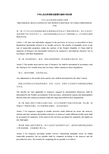
中华人民共和国营业税暂行条例中英对照中华人民共和国营业税暂行条例PROVISIONAL REGULATIONS OF THE PEOPLE'S REPUBLIC OF CHINA ONBUSINESSTAX第一条在中华人民共和国境内提供本条例规定的劳务(以下简称应税劳务)、转让无形资产或者销售不动产的单位和个人,为营业税的纳税义务人(以下简称纳税人),应当依照本条例缴纳营业税。
Article 1 All units and individuals engaged in the provision of services as prescribed in these Regulations (hereinafter referred to as 'taxable services'), the transfer of intangible assets or the sale of immovable properties within the territory of the People's Republic of China shall be taxpayers of Business Tax (hereinafter referred to be 'taxpayers'), and shall pay Business Tax in accordance with these Regulations.第二条营业税的税目、税率,依照本条例所附的《营业税税目税率表》执行。
Article 2 The taxable items and tax rates of Business Tax shall be determined in accordance with the <Business Tax Taxable Items and Tax Rates Table> attached to these Regulations.税目、税率的调整,由国务院决定。
营业税暂条例实施细则模板
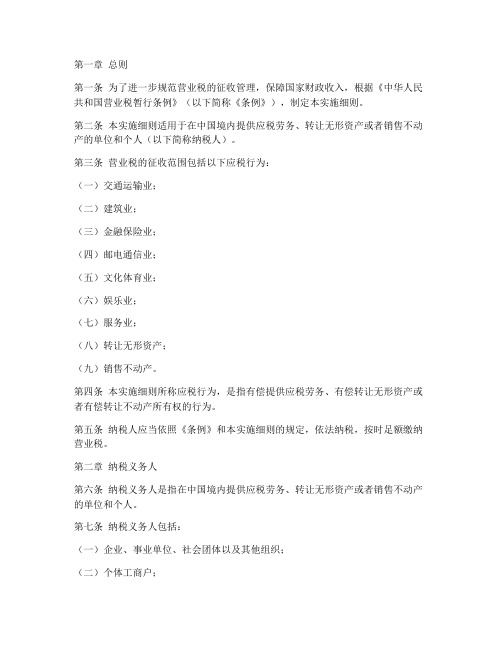
第一章总则第一条为了进一步规范营业税的征收管理,保障国家财政收入,根据《中华人民共和国营业税暂行条例》(以下简称《条例》),制定本实施细则。
第二条本实施细则适用于在中国境内提供应税劳务、转让无形资产或者销售不动产的单位和个人(以下简称纳税人)。
第三条营业税的征收范围包括以下应税行为:(一)交通运输业;(二)建筑业;(三)金融保险业;(四)邮电通信业;(五)文化体育业;(六)娱乐业;(七)服务业;(八)转让无形资产;(九)销售不动产。
第四条本实施细则所称应税行为,是指有偿提供应税劳务、有偿转让无形资产或者有偿转让不动产所有权的行为。
第五条纳税人应当依照《条例》和本实施细则的规定,依法纳税,按时足额缴纳营业税。
第二章纳税义务人第六条纳税义务人是指在中国境内提供应税劳务、转让无形资产或者销售不动产的单位和个人。
第七条纳税义务人包括:(一)企业、事业单位、社会团体以及其他组织;(二)个体工商户;(三)承包承租经营人;(四)从事营业税应税行为的个人。
第八条纳税义务人应当依照《条例》和本实施细则的规定,办理税务登记,取得税务登记证件。
第三章应纳税额的计算第九条营业税的计税依据为纳税人提供应税劳务、转让无形资产或者销售不动产的营业额。
第十条营业额的确定原则如下:(一)应税劳务的营业额为提供应税劳务的价款;(二)转让无形资产的营业额为转让无形资产所取得的价款;(三)销售不动产的营业额为销售不动产所取得的价款。
第十一条纳税人从事应税行为的,应当依法计算应纳税额。
第十二条营业税的税率:(一)交通运输业、建筑业、邮电通信业、文化体育业、娱乐业、服务业,税率为3%;(二)金融保险业,税率为5%;(三)转让无形资产,税率为5%;(四)销售不动产,税率为5%。
第四章纳税申报与缴纳第十三条纳税人应当依照法律、行政法规的规定,按照规定的期限和方式向税务机关申报纳税。
第十四条纳税人申报纳税时,应当如实填写纳税申报表,并附送有关资料。
企业所得税法中英对照
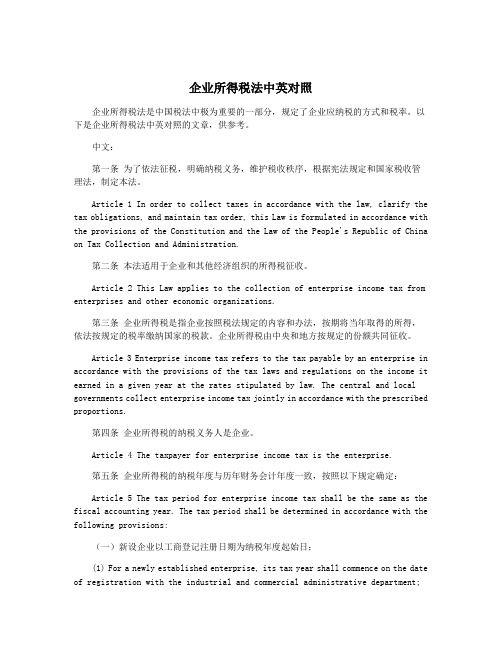
企业所得税法中英对照企业所得税法是中国税法中极为重要的一部分,规定了企业应纳税的方式和税率。
以下是企业所得税法中英对照的文章,供参考。
中文:第一条为了依法征税,明确纳税义务,维护税收秩序,根据宪法规定和国家税收管理法,制定本法。
Article 1 In order to collect taxes in accordance with the law, clarify the tax obligations, and maintain tax order, this Law is formulated in accordance with the provisions of the Constitution and the Law of the People's Republic of China on Tax Collection and Administration.第二条本法适用于企业和其他经济组织的所得税征收。
Article 2 This Law applies to the collection of enterprise income tax from enterprises and other economic organizations.第三条企业所得税是指企业按照税法规定的内容和办法,按期将当年取得的所得,依法按规定的税率缴纳国家的税款。
企业所得税由中央和地方按规定的份额共同征收。
Article 3 Enterprise income tax refers to the tax payable by an enterprise in accordance with the provisions of the tax laws and regulations on the income it earned in a given year at the rates stipulated by law. The central and local governments collect enterprise income tax jointly in accordance with the prescribed proportions.第四条企业所得税的纳税义务人是企业。
【英文】中华人民共和国营业税暂行条例实施细则
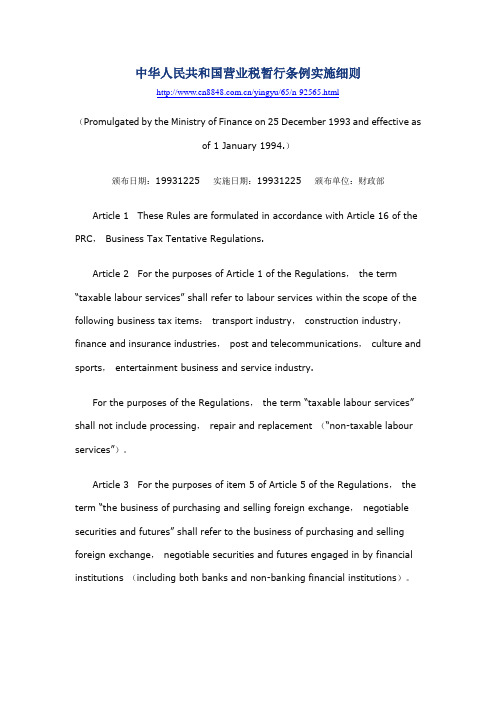
中华人民共和国营业税暂行条例实施细则/yingyu/65/n-92565.html(Promulgated by the Ministry of Finance on 25 December 1993 and effective asof 1 January 1994.)颁布日期:19931225 实施日期:19931225 颁布单位:财政部Article 1These Rules are formulated in accordance with Article 16 of the PRC,Business Tax Tentative Regulations.Article 2For the purposes of Article 1 of the Regulations,the term “taxable labour services” shall refer to labour services within the scope of the following business tax items:transport industry,construction industry,finance and insurance industries,post and telecommunications,culture and sports,entertainment business and service industry.For the purposes of the Regulations,the term “taxable labour services” shall not include processing,repair and replacement (“non-taxable labour services”)。
Article 3For the purposes of item 5 of Article 5 of the Regulations,the term “the business of purchasing and selling forei gn exchange,negotiable securities and futures” shall refer to the business of purchasing and selling foreign exchange,negotiable securities and futures engaged in by financial institutions (including both banks and non-banking financial institutions)。
93版【中英文】中华人民共和国增值税暂行条例实施细则
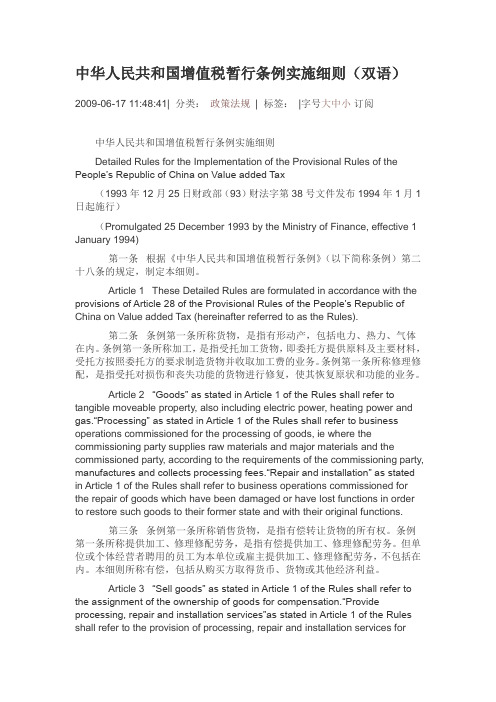
中华人民共和国增值税暂行条例实施细则(双语)2009-06-17 11:48:41| 分类:政策法规| 标签:|字号大中小订阅中华人民共和国增值税暂行条例实施细则Detailed Rules for the Implementation of the Provisional Rules of the People’s Republic of China on Value added Tax(1993年12月25日财政部(93)财法字第38号文件发布1994年1月1日起施行)(Promulgated 25 December 1993 by the Ministry of Finance, effective 1 January 1994)第一条根据《中华人民共和国增值税暂行条例》(以下简称条例)第二十八条的规定,制定本细则。
Article 1 These Detailed Rules are formulated in accordance with the provisions of Article 28 of the Provisional Rules of the People’s Republic of China on Value added Tax (hereinafter referred to as the Rules).第二条条例第一条所称货物,是指有形动产,包括电力、热力、气体在内。
条例第一条所称加工,是指受托加工货物,即委托方提供原料及主要材料,受托方按照委托方的要求制造货物并收取加工费的业务。
条例第一条所称修理修配,是指受托对损伤和丧失功能的货物进行修复,使其恢复原状和功能的业务。
Article 2 “Goods” as stated in Article 1 of the Rules shall refer to tangible moveable property, also including electric power, heating power and gas.“Processing” as stated in Article 1 of the Rules shall refer to business operations commissioned for the processing of goods, ie where the commissioning party supplies raw materials and major materials and the commissioned party, according to the requirements of the commissioning party, manufactures and collects processing fees.“Repair and installation” as stated in Article 1 of the Rules shall refer to business operations commissioned for the repair of goods which have been damaged or have lost functions in order to restore such goods to their former state and with their original functions.第三条条例第一条所称销售货物,是指有偿转让货物的所有权。
中华人民共和国营业税暂行条例实施细则(2008年修订)-财政部、国家税务总局令第52号

中华人民共和国营业税暂行条例实施细则(2008年修订)正文:---------------------------------------------------------------------------------------------------------------------------------------------------- 财政部、国家税务总局令(第52号)《中华人民共和国营业税暂行条例实施细则》已经财政部部务会议和国家税务总局局务会议审议通过,现予公布,自2009年1月1日起施行。
财政部部长谢旭人税务总局局长肖捷二○○八年十二月十五日中华人民共和国营业税暂行条例实施细则第一条根据《中华人民共和国营业税暂行条例》(以下简称条例),制定本细则。
第二条条例第一条所称条例规定的劳务是指属于交通运输业、建筑业、金融保险业、邮电通信业、文化体育业、娱乐业、服务业税目征收范围的劳务(以下称应税劳务)。
加工和修理、修配,不属于条例规定的劳务(以下称非应税劳务)。
第三条条例第一条所称提供条例规定的劳务、转让无形资产或者销售不动产,是指有偿提供条例规定的劳务、有偿转让无形资产或者有偿转让不动产所有权的行为(以下称应税行为)。
但单位或者个体工商户聘用的员工为本单位或者雇主提供条例规定的劳务,不包括在内。
前款所称有偿,是指取得货币、货物或者其他经济利益。
第四条条例第一条所称在中华人民共和国境内(以下简称境内)提供条例规定的劳务、转让无形资产或者销售不动产,是指:(一)提供或者接受条例规定劳务的单位或者个人在境内;(二)所转让的无形资产(不含土地使用权)的接受单位或者个人在境内;(三)所转让或者出租土地使用权的土地在境内;(四)所销售或者出租的不动产在境内。
第五条纳税人有下列情形之一的,视同发生应税行为:(一)单位或者个人将不动产或者土地使用权无偿赠送其他单位或者个人;(二)单位或者个人自己新建(以下简称自建)建筑物后销售,其所发生的自建行为;(三)财政部、国家税务总局规定的其他情形。
税则 英文版
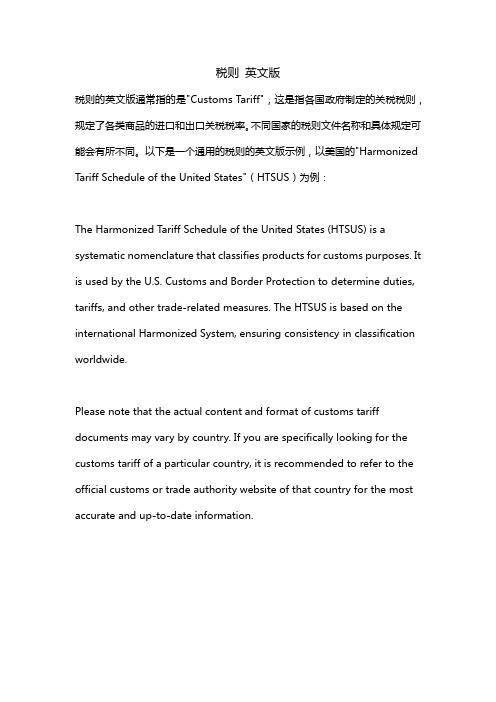
税则英文版税则的英文版通常指的是"Customs Tariff",这是指各国政府制定的关税税则,规定了各类商品的进口和出口关税税率。
不同国家的税则文件名称和具体规定可能会有所不同。
以下是一个通用的税则的英文版示例,以美国的"Harmonized Tariff Schedule of the United States"(HTSUS)为例:The Harmonized Tariff Schedule of the United States (HTSUS) is a systematic nomenclature that classifies products for customs purposes. It is used by the U.S. Customs and Border Protection to determine duties, tariffs, and other trade-related measures. The HTSUS is based on the international Harmonized System, ensuring consistency in classification worldwide.Please note that the actual content and format of customs tariff documents may vary by country. If you are specifically looking for the customs tariff of a particular country, it is recommended to refer to the official customs or trade authority website of that country for the most accurate and up-to-date information.。
营业税实施条例细则英文版.doc
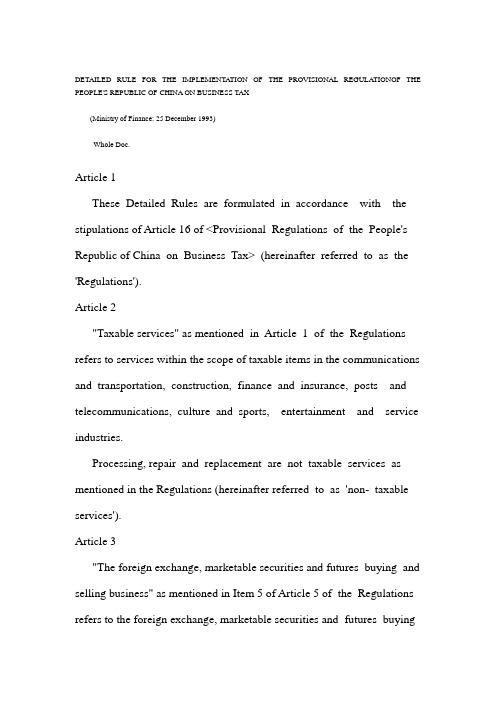
DETAILED RULE FOR THE IMPLEMENTA TION OF THE PROVISIONAL REGULATIONOF THE PEOPLE'S REPUBLIC OF CHINA ON BUSINESS TAX(Ministry of Finance: 25 December 1993)Whole Doc.Article 1These Detailed Rules are formulated in accordance with the stipulations of Article 16 of <Provisional Regulations of the People's Republic of China on Business Tax> (hereinafter referred to as the 'Regulations').Article 2"Taxable services" as mentioned in Article 1 of the Regulations refers to services within the scope of taxable items in the communications and transportation, construction, finance and insurance, posts and telecommunications, culture and sports, entertainment and service industries.Processing, repair and replacement are not taxable services as mentioned in the Regulations (hereinafter referred to as 'non- taxable services').Article 3"The foreign exchange, marketable securities and futures buying and selling business" as mentioned in Item 5 of Article 5 of the Regulations refers to the foreign exchange, marketable securities and futures buyingand selling business carried on by financial institutions (including banks and non-bank financial institutions). The buying and selling of foreign exchange, marketable securities or futures by non-financial institutions or individuals shall not be subject to Business Tax."Futures" as mentioned in Item 5 of Article 5 of the Regulations refer to non-commodities futures. Futures on commodities shall not be subject to Business Tax.Article 4"Provision of taxable services, transfer of intangible assets or the sale of immovable properties" as mentioned in Article 1 of the Regulationsrefers to activities of providing taxable services, transferring intangible assets or ownership of immovable properties with consideration(hereinafter referred to as the 'taxable activities'). However, taxable services provided by the staff employed by units or individual operators to their own units or employers shall not be included therein.The term "with consideration" in the preceding paragraph includes receipt of currency, goods and other economic benefits.For units or individuals that sell their newly self- constructed buildings (hereinafter referred to as 'self- construction'), theirself-construction activities shall be regarded as provision of taxableservices.Transfers of limited property rights, or permanent rights, to use immovable properties, and transfers by units of immovable properties byway of gifts to others shall be regarded as sales of immovable properties.Article 5A sales activity that involves both taxable services and goods is deemed to be a mixed sales activity. Mixed sales activities of enterprises, enterprise units or individual business operators engaged in production, wholesale or retail of goods shall be classified as sales of goods, and Business Tax shall not be levied on the sales; mixed sales activities of other units and individuals shall be classified as provisionof taxable services, and Business Tax shall be levied on the sales.Whether taxpayers' sales activities are mixed sales activities shallbe determined by the collection authorities under the State Administration of Taxation."Goods" as mentioned in Paragraph 1 refers to tangible moveable goods, including electricity, heat and gas."Enterprises, enterprise units or individual business operators engaged in the production, wholesale and retail of goods" as mentioned inParagraph 1 include enterprises, units with an enterprise nature and individual business operators engaged principally in the production, wholesale and retail of goods, and also engaged in taxable services. Article 6For taxpayers engaged in both taxable services and the sales of goods or non-taxable services, the sales amount of taxable services and the sales amount of goods or non-taxable services shall be accounted for separately. For taxpayers that have not accounted for separately or cannot account for accurately, the taxable services and goods and non-taxable services shall together be subject to Value Added Tax, and Business Tax shall not be levied.Whether the taxable services engaged concurrently by taxpayers are together subject to Value Added Tax, this tax shall be determined by the collection authorities under the State Administration of Taxation.Article 7Except as otherwise stipulated in Article 8 of these Detailed Rules, any one of the following activities shall be regarded as provision of taxable services, transfer of intangible assets or sale of immovable properties within the territory of the People's Republic of China (hereinafter referred to as 'within the territory') as mentioned in Article 1 of the Regulations:(1) Provision of services occurs within the territory;(2) Transportation from within the territory of passengers or cargos to outside the territory;(3) Organization of tourist groups within the territory to travel outside the territory;(4) Transfer of intangible assets to be used within the territory.(5) Sales of immovable properties located within the territoryArticle 8Any one of the following situations shall be providing insurance services within the territory:(1) Insurance services provided by insurance organizations within the territory, except for insurance provided for export goods by insurance organizations within the territory.(2) Insurance services provided by insurance organizations outside the territory in relation to goods within the territory.Article 9"Units" as mentioned in Article 1 of the Regulations refers to State-owned enterprises, collectively owned enterprises, private enterprises, joint stock enterprises, other enterprises and administrative units, institutions, military units, social groups and other units."Individuals" as mentioned in Article 1 of the Regulations refers to individual industrial or commercial households and other individuals thathave business activities.Article 10For enterprises which lease or contract to other to operate, the lessees or sub-contractors shall be the taxpayer.Article 11Except otherwise stipulated in Article 12 of these Detailed Rules, units that are liable to Business Tax shall be those that have taxable activities and receive money, goods or other economic benefits from the other parties. They shall include units both with and without independent accounting.Article 12The taxpayer for the business of central railway transportation shall be the Ministry of Railways. The taxpayers for the business of Sino-foreign equity joint venture railway transportation shall be the joint venture railway companies. The taxpayers for the business of local railway transportation shall be the local organization for railway administration. The taxpayers for the business of provisional administration for infrastructural route transportation shall be the organization for provisional administration for infrastructural routes.Units engaged in the business of waterway, air, pipeline and other land transportation liable to Business Tax shall be those units engaged in transportation business and accountable for profit or loss.Article 13Charges of legislative, judicial and administrative authorities that meet the following conditions shall not be subject to Business Tax;(1) Charges which are permitted under official documents by the State Council, provincial People's governments, or the finance or pricing departments thereunder, and where the charging standard is in accordancewith the stipulations of the documents.(2) Charges which are collected directly by the legislative, judicial and administrative authorities themselves.Article 14"Other charges" as mentioned in Article 5 of the Regulations shall include handing fees, funds, fund raising fees, receipts on behalf, payment on behalf and other charges of every nature received from otherparties.All other charges shall be included in the turnover in computing the tax payable regardless of the treatments applicable according to the stipulations of the accounting policies.Article 15Where the prices of the taxpayers providing taxable services,transferring intangible assets or selling immovable properties are obviously low and without proper justification, the competent tax authorities shall have the right to determine the turnover according to the following sequence:(1) Determined according to the average prices of similar services provided or similar immovable properties sold by the taxpayers in the samemonth.(2) Determined according to the average prices of similar services provided or similar immovable properties sold by the taxpayers in the mostrecent period.(3) Determined according to the following formula:Assessable Operating (1 + the cost plus margin rate)value = costs or X -------------------------------Project costs (1 - Business Tax rate)The cost-plus margin rate in the above formula shall be determined by the tax authorities under the People's governments of the provinces, autonomous regions and municipalities.Article 16In accordance with the stipulations of Article 4 of the Regulations, taxpayers settling the turnover in foreign currencies can select to convert the turnover into Renminbi according to the exchange rate quotedby the State of either the date the turnover occurs or on the first dateof the month (the average rate in principle). However, the Renminbi conversion rate for the turnover of financial and insurance enterprises shall be the exchange rate ascertained in the prior year's financial statements.Taxpayers shall decide in advance the conversion rate selected. Once selected, it cannot be changed within one year.Article 17Turnover of transportation enterprises engaged in through transport business shall be the turnover actually received."Other situations" as mentioned in Item 6 of Article 5 of the Regulations include tourist enterprises organising tourist groups to travel within the territory of China. The turnover shall be the balanceof tourist fees received after deduction of room charges, meal charges, transportation, admission fees and other charges paid to other units on behalf of the tourists.Article 18For taxpayers engaged in construction, repair and decoration project operations, their turnover shall include the prices of raw materials, other materials and energy used in the projects irrespective of the method in which the accounts are settled with the other parties.For taxpayers engaged in installation project operations, as far as the price of the equipment installed is taken as part of installation project sum, their turnover shall include the price of the equipment. Article 19The turnover of self-construction activities as mentioned in Article4 of these Detailed Rules shall be determined with reference to the stipulations of Article 15 of these Detailed Rules.Article 20"Re-lending business" as mentioned in Item (4) of Article 5 of the Regulations refers to the business of lending to others the funds borrowed. Lending to others with the funds from deposits taken from unitsor individuals and the funds from lender's own capital contributions shall not be regarded as relenting business.Article 21For insurance business that reinsures with other parties, the turnover of the initial insurance business shall be the total insurance premiums after deduction of the premiums paid to the reinsurers.Article 22For entertainment performances by units or individuals, the turnover shall be the total box-office proceeds or block-booking proceeds after deduction of the payments to units providing performance venues, entertainment companies and managers.Article 23Turnover of the entertainment business shall be the various charges collected from customers in the entertainment business operations, including box-office receipts, on-stage fees, song dedication fees, charges on cigarettes and drinks, and other charges in the entertainment business operations.Article 24For travel business, the turnover shall be the balance of total charges after deduction of payments to other units for meals, lodging and transportation for the tourists.For travel enterprises that organise tours within the territory and then hand over the groups to other travel enterprises, the turnover shall be determined with reference to the stipulations of Item 2 of Article 5 of the Regulations.Article 25For units giving immovable properties to others as free gift, the turnover shall be determined with reference to the stipulations of Article15 of these Detailed Rules.Article 26The scope of the tax-exempt items as stipulated in Article 6 of the Regulations shall be defined as follows:(1) "Personal services provided on individual basis by the disabled" as mentioned in Paragraph 1, Item 2 refers to services provided to the Public by the disabled individual.(2) "Medical services provided by hospitals, clinics and other medical institutions" as mentioned in Paragraph 1, Item 3 refers to such services as diagnosis and treatment to patients, epidemic prevention, child delivery and family planning, as well as the business of providing medicine, medical apparatus, hospital lodging and meals in relation to these services.(3) "Schools and other educational institutions" as mentioned in Paragraph 1, Item 4 refers to ordinary schools and schools of various kinds approved to be established by the People's governments above theprefecture and city levels or departments for educational administration under governments of the same level and where the academic qualificationsof their students are recognized by the State.(4) "Agricultural mechanical ploughing" as mentioned in Paragraph 1, Item 5 refers to the business of farming operations applying agricultural machinery in farming, forestry and husbandry (including ploughing, planting, harvesting, threshing and plant protection)."Irrigation and drainage" refers to the business of irrigation and drainage of farmland."Prevention and treatment of diseases and insect pests" refers to the business of forecast, prevention and treatment of diseases and insect pests for farming, forestry, husbandry and fishery."Insurance for farming and husbandry" refers to the business of providing insurance to animals and plants grown and raised in planting, breeding and husbandry."Related technical training" refers to technical training services related to the business of agricultural mechanical ploughing, irrigation and drainage, prevention and treatment of diseases and insect pests, and plant protection, as well as services to enable the farmers to obtain knowledge of insurance for farming and husbandry.The scope of the tax exemption for the breeding and the prevention and treatment of diseases of poultry, livestock and aquatic animals includes the business of providing medicine and medical apparatus in relation to those services.(5) "Cultural activities conducted by memorial hall, museum, culturalcentre, art gallery, exhibition hall, academy of painting and calligraphy, library and cultural protective units" as mentioned in Paragraph 1, Item 6 refers to cultural activities that fall within the taxable scope of taxable items under culture and sports activities conducted by those units in their own locations. The admission fees refers to the box-office receipts on the sales at the first entrance."Admission fees for cultural and religious activities conducted at places of religious worship" refers to cultural and religious activities held by temples, Taoist temples, mosques and churches.Article 27The application of the Business Tax minimum threshold as mentioned inArticle 8 of the Regulations shall be limited to individuals.Ranges for the Business Tax minimum threshold are as follows:For those assessable on a period basis, the Business Tax minimum threshold shall be a monthly turnover of 200-800 yuan.For those assessable on a transaction basis, the Business Tax minimumthreshold shall be turnover of 50 yuan per transaction (or per day).Taxpayers whose turnovers reach the minimum threshold shall computethe tax payable based on the total turnover.The tax authorities under the People's governments of provinces, autonomous regions and municipalities shall determine the minimu mthreshold locally applicable within the prescribed ranges and in accordance with the actual conditions, and shall report the amounts to the State Administration of Taxation for their records.Article 28For taxpayers transferring land use rights or selling immovable properties that accept receipts in advance, the timing at which the tax liability arises shall be the date on which the advance receipts are received.For taxpayers that have self-construction activities as mentioned in Article 4 of these Detailed Rules, the timing at which the tax liability arises on the self-construction activities shall be the date on which the self-constructed buildings are sold and the turnovers are received or the documented evidence of the right to collect the sales sum is obtained.For taxpayer giving immovable properties to others as free gift, the timing at which the tax liability arises shall be the date on which the titles of the immovable properties are transferred.Article 29Other withholding agents as mentioned in Article 11 of theRegulations are defined as follows:(1) For overseas units or individuals that have taxable activities within the territory but have not set up any establishment within the territory, the agents shall be the withholding agents for their tax payable. If there are no agents, the transferees and the purchasers shall be the withholding agents.(2) For units or individuals that present performances where the tickets are sold by others, the ticket sellers shall be the withholding agents for their tax payable.(3) For individual performance managers, the ticket sellers shall be the withholding agents on their tax payable on the performance managementbusiness.(4) For reinsurance business, the initial insurers shall be the withholding agents.(5) For individuals transferring other intangible assets as mentioned in Item 2, Article 12 of the Regulations, the transferees shall be the withholding agents for their tax payable.Article 30For taxpayers providing taxable services that take place in a different county (or city) that should report and pay tax with thecompetent tax authorities where the services taken place but have not reported or paid the tax, the competent tax authorities where the establishments are located or where the individuals reside shall collect the overdue tax.Article 31Taxpayers with contracted projects extending across provinces, autonomous regions and municipalities shall report and pay tax to the competent tax authorities where the establishments are located.Article 32For taxpayers that have taxable activities within the area of their own province, autonomous region and municipality, and need to change thetax payment location, the location shall be determined by tax authorities under the People's governments of the province, autonomous region or municipality.Article 33The assessable period for the financial industry (excluding pawn-broking) shall be one quarter of a year.The assessable period for the insurance industry shall be one month. Article 34The terms "above" and "below" as mentionedin these Detailed Rulesalso include the figure or level itself.Article 35These Detailed Rules shall be interpreted by the Ministry of Finance or by the State Administration of Taxation.Article 36These Detailed Rules shall be implemented on the same day the Regulations are come into effect. The <Detailed Rules and Regulations forthe Implementation of the Draft Regulations of the People's Republic of China on Business Tax> promulgated on September 28, 1984 shall be repealedon the same date.。
营业税税法暂行条例英文版
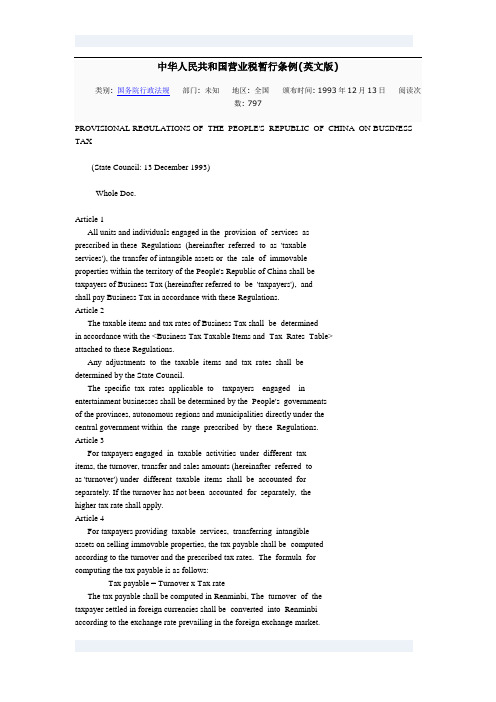
中华人民共和国营业税暂行条例(英文版)类别: 国务院行政法规部门: 未知地区: 全国颁布时间: 1993年12月13日阅读次数: 797PROVISIONAL REGULATIONS OF THE PEOPLE'S REPUBLIC OF CHINA ON BUSINESS TAX(State Council: 13 December 1993)Whole Doc.Article 1All units and individuals engaged in the provision of services asprescribed in these Regulations (hereinafter referred to as 'taxableservices'), the transfer of intangible assets or the sale of immovableproperties within the territory of the People's Republic of China shall betaxpayers of Business Tax (hereinafter referred to be 'taxpayers'), andshall pay Business Tax in accordance with these Regulations.Article 2The taxable items and tax rates of Business Tax shall be determinedin accordance with the <Business Tax Taxable Items and Tax Rates Table>attached to these Regulations.Any adjustments to the taxable items and tax rates shall bedetermined by the State Council.The specific tax rates applicable to taxpayers engaged inentertainment businesses shall be determined by the People's governmentsof the provinces, autonomous regions and municipalities directly under thecentral government within the range prescribed by these Regulations.Article 3For taxpayers engaged in taxable activities under different taxitems, the turnover, transfer and sales amounts (hereinafter referred toas 'turnover') under different taxable items shall be accounted forseparately. If the turnover has not been accounted for separately, thehigher tax rate shall apply.Article 4For taxpayers providing taxable services, transferring intangibleassets on selling immovable properties, the tax payable shall be computedaccording to the turnover and the prescribed tax rates. The formula forcomputing the tax payable is as follows:Tax payable = Turnover x Tax rateThe tax payable shall be computed in Renminbi, The turnover of thetaxpayer settled in foreign currencies shall be converted into Renminbiaccording to the exchange rate prevailing in the foreign exchange market.Article 5The turnover of the taxpayers shall be the total consideration andall other changes receivable from the payers for the provision of taxable services transfer of intangible assets or sales of immovable properties by the taxpayers, except for the following situations:(1) For transportation enterprises which carry passengers or cargoes from the territory of the People's Republic of China to over seas locations and trans-ship passengers or cargoes to other transportation enterprises overseas, the turnover shall be the balance of transport charges for the whole journey less the transport charges paid to the sub-contracted transportation enterprises.(2) For travel enterprises which organize tourist groups to travel outside the territory of the People's Republic of China and sub-contract to other travel enterprises overseas, the turnover shall be the balance of the tourist charges for the whole journey less the payments made to those sub-contracted travel enterprises.(3) For the main contractors in the construction business who sub-contract work to others, the turnover shall be the balance of the total contract sum less the payments made to the sub- contractors.(4) For re-lending businesses, the turnover shall be the balance of interest on lending less the interest on borrowing.(5) For businesses buying and selling foreign currencies, marketable securities and futures, the turnover shall be the balance of the selling prices less the buying prices.(6) Other situations as regulated by the Ministry of Finance.Article 6The following items shall be exempt from Business Tax:(1) Nursing services provided by nurseries, kindergartens, homes for the aged, welfare institutions for the handicapped, matchmaking and funeral services.(2) Services provided on individual basis by the disabled.(3) Medical services provided by hospitals, clinics and other medical institutions.(4) Educational services provided by schools and other educational institutions; and services provided by students participating in work-study programs.(5) Agricultural mechanical ploughing, irrigation and drainage, prevention and treatment of plant diseases and insect pests, plant protection, insurance for farming and animal husbandry, and related technical training services; breeding and the prevention and treatment of diseases of poultry, livestock and aquatic animals.(6) Admission fees for cultural activities conducted by memorial hall, museum, cultural centre, art gallery, exhibition hall, academy ofpainting and calligraphy, library and cultural protective units; admission fees for cultural and religious activities conducted at places of religious worship.Except as stipulated in the above paragraphs, the Business Tax exemption and reduction items shall be regulated by the State Council. Local governments or departments shall not regulate any tax exemption or reduction items.Article 7For taxpayers engaged in tax exempt or tax reduced items, the turnover shall be accounted for separately. if the turnover has not been separately accounted for, no exemption of reduction is allowed.Article 8For taxpayers whose turnover has not reached the Business Tax minimum threshold stipulated by the Ministry of Finance, the Business Tax shall be exempt.Article 9The time at which a liability to Business Tax arises shall be thedate on which the business proceeds are received or documented evidence of right to collect business proceeds is obtained by the taxpayer.Article 10Business Tax shall be collected by the tax authorities.Article 11Business Tax withholding agents are as follows:(1) For financial institutions entrusted to grant loans, the entrusted financial institutions shall be the withholding agents.(2) For sub-contracting of construction and installation business,the main contractors shall be the withholding agents.(3) Other withholding agents as stipulated by the Ministry of Finance.Article 12The place for the payment of Business Tax is as follows:(1) Taxpayers providing taxable services shall report and pay tax tothe local competent tax authorities where the taxable services take place. Taxpayers engaged in the transportation business shall report and pay taxto the local competent tax authorities where the business establishment is located.(2) Taxpayers transferring land use rights shall report and pay taxto the local competent tax authorities where the land is located. Taxpayers transferring other intangible assets shall report and pay tax tothe local competent tax authorities where the establishment is located.(3) Taxpayers selling immovable properties shall report and pay taxto the local competent tax authorities where the immovable properties are located.Article 13The Business Tax assessable period shall be five days, ten days, fifteen days or one month. The actual assessable period of taxpayers shall be determined by the competent tax authorities according to the magnitude of the tax payable of the taxpayers; tax that cannot be assessed in regular periods may be assessed on a transaction-by-transaction basis.Taxpayers that adopt one month as an assessable period shall report and pay tax within ten days following the end of the period. If an assessable period of five days, ten days or fifteen days is adopted, thetax shall be prepaid within five days following the end of the period anda monthly tax return shall be filed with any balance of tax due settled within ten days from the first day of the following month.The tax payment deadlines for withholding agents shall be determined with reference to the stipulations of the above two paragraphs.Article 14The collection and administration of Business Tax shall be conducted in accordance with the relevant regulations of the <Law of the People's Republic of China on Tax Collection and Administration> and these Regulations.Article 15The collection of Business Tax from foreign investment enterprises and foreign enterprises shall be conducted in accordance with the resolutions of the Standing Committee of the National People's Congress. Article 16The Ministry of Finance shall be responsible for the interpretationof these Regulations and for the formulation of the Detailed Rules and Regulations for the Implementation of these Regulations.Article 17These Regulations shall come into effect from January 1, 1994, The <Draft Regulations of the People's Republic of China on Business Tax> promulgated by the State Council on September 18, 1984 shall be repealed on the same date.BUSINESS TAX TAXABLE ITEMS AND TAX RATES TABLE-----------------------------------------------------------------------Taxableitems Scope of charge Tax Rate %-----------------------------------------------------------------------1. Communicationsand transportation Transportation by land, water, 3air and pipeline, loadingunloading and delivery2. Construction Construction, installation,repair, decoration and otherengineering work 33. Finance and insurance 54. Posts andtelecommunications 35. Culture and sports 36. Entertainment Singing bars, dance halls, 5-20karaoke lounges, commercialmusic halls, musical teahouses, billiards, golf,bowling and amusementfacilities7. Servicing Agency, hotel, catering, 5tourism, warehousing,leasing, advertising andother services8. Transfer ofintangible assets Transfer of land-use rights, 5patent rights, unpatchtedtechnologies, trade marks,copyrights and goodwill9. Sale of immovableproperties Sale of buildings and other 5attachments to land-----------------------------------------------------------------------毋意,毋必,毋固,毋我。
企业所得税法中英对照
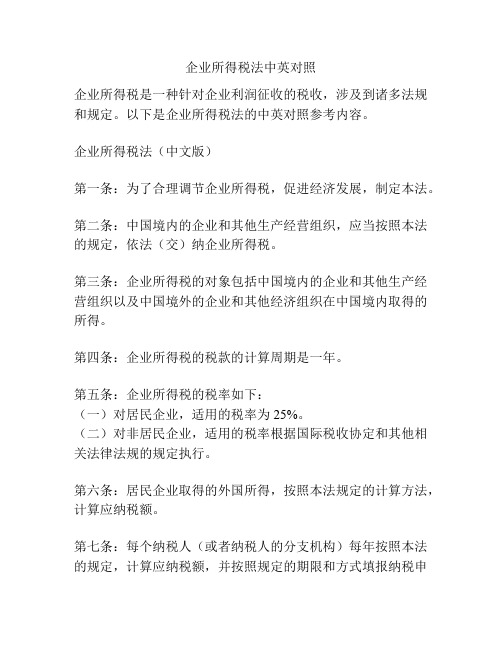
企业所得税法中英对照企业所得税是一种针对企业利润征收的税收,涉及到诸多法规和规定。
以下是企业所得税法的中英对照参考内容。
企业所得税法(中文版)第一条:为了合理调节企业所得税,促进经济发展,制定本法。
第二条:中国境内的企业和其他生产经营组织,应当按照本法的规定,依法(交)纳企业所得税。
第三条:企业所得税的对象包括中国境内的企业和其他生产经营组织以及中国境外的企业和其他经济组织在中国境内取得的所得。
第四条:企业所得税的税款的计算周期是一年。
第五条:企业所得税的税率如下:(一)对居民企业,适用的税率为25%。
(二)对非居民企业,适用的税率根据国际税收协定和其他相关法律法规的规定执行。
第六条:居民企业取得的外国所得,按照本法规定的计算方法,计算应纳税额。
第七条:每个纳税人(或者纳税人的分支机构)每年按照本法的规定,计算应纳税额,并按照规定的期限和方式填报纳税申报表。
第八条:纳税人或者其分支机构因为特殊情况无法按照规定的期限填报纳税申报表的,可以向税务机关提出延期申请。
第九条:税务机关负责对企业所得税的纳税申报进行审核。
第十条:企业所得税的减免、免税和优惠,按照国家和地方税务机关的规定执行。
第十一条:纳税人应当按照国家和地方税务机关的规定,进行企业所得税的预缴。
第十二条:纳税人应当按照国家和地方税务机关的规定,进行企业所得税的年终汇算清缴。
第十三条:纳税人未按照本法规定的期限申报或者不符合预缴、年终汇算清缴的,税务机关可以责令补正,并按照法定程序征收滞纳金。
第十四条:对于故意偷逃税款的纳税人,税务机关可以按照法定程序追究其法人和责任人员的法律责任。
企业所得税法(英文版)Article 1: In order to reasonably adjust enterprise income tax and promote economic development, this law is enacted.Article 2: Enterprises and other production and business organizations within the territory of China shall, in accordance with the provisions of this law, pay enterprise income tax in accordance with the law.Article 3: The objects of enterprise income tax include enterprises and other production and business organizations within the territory of China, as well as enterprises and other economic organizations outside the territory of China that obtain income within the territory of China.Article 4: The calculation period for enterprise income tax is one year.Article 5: The tax rates for enterprise income tax are as follows:(1) For resident enterprises, the applicable tax rate is 25%.(2) For non-resident enterprises, the applicable tax rate shall be implemented in accordance with the provisions of international tax agreements and other relevant laws and regulations.Article 6: Foreign income obtained by resident enterprises shall be calculated and taxed according to the calculation method prescribed in this law.Article 7: Each taxpayer (or the branch of the taxpayer) shall calculate the amount of tax payable in accordance with the provisions of this law each year, and fill out the tax return within the prescribed time and in the prescribed manner.Article 8: If a taxpayer or its branch is unable to submit the taxreturn within the prescribed time due to special circumstances, it may apply for an extension to the tax authority.Article 9: The tax authority is responsible for reviewing the tax returns of enterprise income tax.Article 10: Reductions, exemptions, and preferential treatments for enterprise income tax shall be implemented in accordance with the provisions of the national and local tax authorities.Article 11: Taxpayers shall make prepayments of enterprise income tax in accordance with the provisions of the national and local tax authorities.Article 12: Taxpayers shall make final settlement payments of enterprise income tax at the end of the year in accordance with the provisions of the national and local tax authorities.Article 13: If a taxpayer fails to file a tax return within the prescribed period or fails to comply with the provisions of prepayments and final settlement payments, the tax authority may order correction and impose a late payment penalty in accordance with statutory procedures.Article 14: For taxpayers who intentionally evade tax payments, the tax authority may pursue legal responsibilities of their legal persons and responsible personnel in accordance with statutory procedures.。
营业税实施条例细则

未来趋势
税收改革
营业税制度可能会 发生变化
纳税人调整经 营策略
纳税人需密切关注 税收政策和法规的 变化,及时调整自
身经营策略
科技化
未来的营业税征收 管理可能更加科技
化和智能化
结语
01 重要指导文件 02 纳税人配合 03 合法征收和使用
参考资料
XXXXX
详细解读 实际案例
XXXXX
标准规范 具体操作
管理措施
风险评估结果有助于纳税人制 定合理的风险管理措施
总结
在营业税风险防控方面,纳税人和税务机关都扮演着重要角 色。通过建立预警机制、加强稽查执法和进行风险评估,可 以有效预防和管理税务风险,维护税收秩序。
● 06
第6章 营业税实施条例总结
实施条例的作用
营业税实施条例的制定和 执行对税收征管工作至关 重要。条例的细则有助于 规范税收征管行为,维护 税收秩序。实施条例的不 断完善和优化有助于提高 税收征管效率。
社会保障
需要根据国家财政 预算和政策进行合 财理政安预算排
政策合理性
纳税人有权了解税款 的使用情况,监督税 了收解的权益合理支出
监督合理支出
总结
营业税征收管理是国家税收体系中至关重要的一环,税收政 策、征收管理、征集和支出环节的合理运作直接关系到国家 财政稳定和经济发展。
● 05
第五章 营业税风险防控
营业税历史沿革
古代赋税制度
营业税的起源可追 溯到古代的赋税制
度
建立营业税制 度
各国在20世纪逐渐 建立起营业税制度
现代营业税制 度
现代营业税制度的 雏形由工业革命时
期开始形成
营业税的目的
提供财政收入
中华人民共和国营业税条例(草案)实施细则
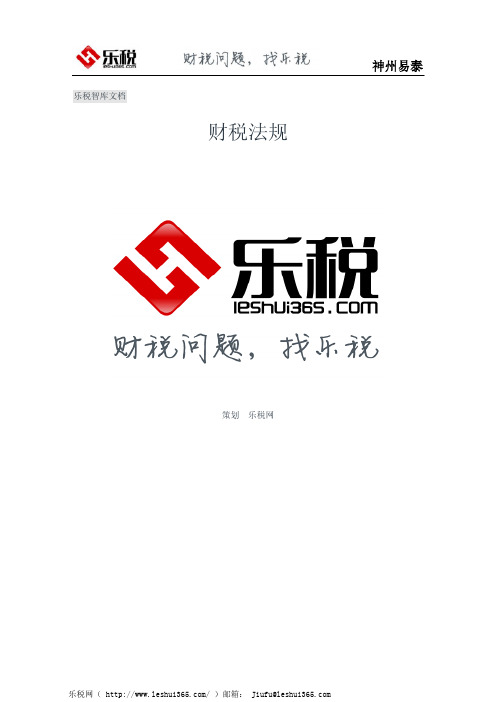
乐税智库文档财税法规策划 乐税网中华人民共和国营业税条例(草案)实施细则【标 签】营业税条例,实施细则【颁布单位】财政部【文 号】【发文日期】1984-09-28【实施时间】1984-09-28【 有效性 】全文失效【税 种】营业税 第一条 根据《中华人民共和国营业税条例(草案)》(以下简称《条例》)第十七条的规定制定本实施细则。
第二条 《条例》第一条所说的纳税人,是指经营《条例》规定应税业务的国营企业、集体企业、个体经营者及其他单位和个人。
第三条 《条例》第二条所说的“纳税人兼有不同经营收入”,是指其经营的业务属于不同税目,根据《条例》规定必须按照不同税率分别纳税的收入。
纳税人对不同的经营收入在帐目上应分别记载。
凡不分别记载的,一律依照其应适用税率中最高的税率征税。
第四条《条例》第三条所说的计税依据,解释如下: 一、商品零售的“商品销售收入额”,是指实际实现的商品销售收入额,不得从中减除任何成本和费用。
但在经营过程中实际发生的销货退回,可以从商品销售收入额中扣除。
二、第二款所说的“商品销售额”,是指实际实现的商品销售收入额,不得从中减除任何成本和费用。
“商品购入原价”,是指所销售商品的实际进价,不得包括任何进货费用。
纳税人批发、调拨所收购的农、林、牧、水产品,其收购环节已纳的产品税,可以计入购入商品原价之内。
三、交通运输业务的“营业收入额”,是指客运收入、货运收入、装卸搬运收入及其他各项运输业务收入和运输票价中包含的保险费收入。
国际运输业务,在国际运输途中其乘客或载运的货物改由其他国际运输企业承运的,付给转运单位的客、货运费,应从全程运输收入中扣除。
四、建>安装的“营业收入额”,是指承包建>安装工程和修缮业务的全部收入。
五、金融业务的“营业收入额”,是指银行及其它经营金融业务的单位经营金融业务所取得的营业收入。
联行往来和专业银行往来利息收入、利差补贴收入及出纳长款等其他收入,可以从营业收入额中扣除。
2024年新营业税暂行条例及实施细则

2024年新营业税暂行条例及实施细则的出台,对于我国的经济社会发展具有重要的意义。
下面将详细分析这一条例及实施细则的主要内容和影响。
新的营业税暂行条例的出台,标志着我国税制取得了重要的进展。
该条例主要包括了营业税的基本规定、征税范围、税率以及纳税申报等方面的内容。
条例的立法目的在于调整和完善现行的营业税制度,进一步优化税制结构,推动税收的合理分配与利用,促进经济发展。
首先,新的营业税暂行条例对于征税范围的规定进行了明确。
条例对于哪些行业或企业需要缴纳营业税进行了界定,包括了销售、服务、代理、转让和资产租赁等行为。
这是为了更好地实现税收的公平与公正,避免税收的规避与逃漏。
同时,对于非营利性组织和个体工商户的征税问题也进行了明确的规定,为各类纳税人的权益保护提供了更为健全的法律依据。
其次,新的营业税暂行条例在税率的设定与调整方面予以了重要的。
条例对于不同行业和企业的营业税税率进行了分类,并规定了相应的具体税率。
这样的分类与差别征税,能够更好地适应市场经济的发展需求,实现税收的差异化征收。
同时,条例还授权了国家税务总局根据经济形势的变化进行相关税率的调整,以适应经济发展的需要。
这样的授权与调整机制,有助于提高税收的适应能力和灵活性。
此外,新的营业税暂行条例在纳税申报与管理方面也进行了难度调整。
条例规定了纳税人行为的规范,明确了申报和缴纳税款的程序和要求。
同时,条例还规定了税务机关的职责与权力,加强了税务管理与监督的力度。
这是为了保护纳税人的合法权益,加强税收的监管与管理,保障税收的公平和透明。
新的营业税暂行条例及实施细则的出台,对于我国的经济社会发展具有深远的影响。
首先,这一条例的出台将有助于实现税制的与优化,进一步完善税收体系,推动税收的公平和效益。
其次,条例的出台将为企业和个人的纳税提供更为清晰和明确的准则,有助于降低税收成本,提高纳税意愿和积极性。
最后,条例的出台将促进税收的科学管理与监督,提高税收收入的质量和效益。
国家税务总局关于发布《税收协定相互协商程序实施办法》的公告_英文版
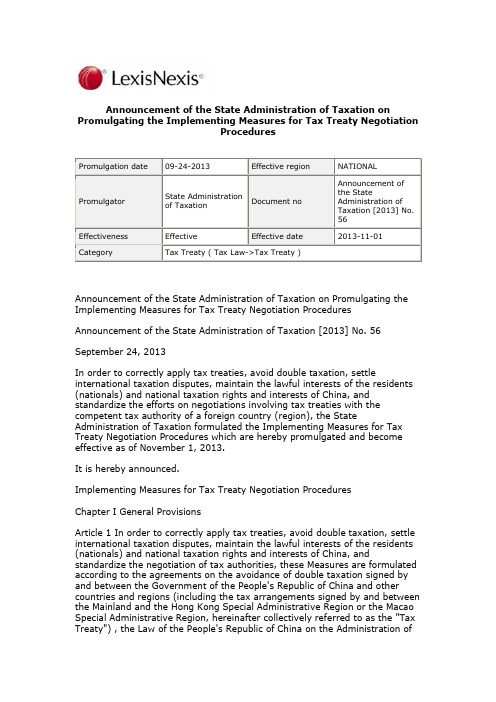
Announcement of the State Administration of Taxation on Promulgating the Implementing Measures for Tax Treaty NegotiationProceduresAnnouncement of the State Administration of Taxation on Promulgating the Implementing Measures for Tax Treaty Negotiation ProceduresAnnouncement of the State Administration of Taxation [2013] No. 56 September 24, 2013In order to correctly apply tax treaties, avoid double taxation, settle international taxation disputes, maintain the lawful interests of the residents (nationals) and national taxation rights and interests of China, and standardize the efforts on negotiations involving tax treaties with the competent tax authority of a foreign country (region), the State Administration of Taxation formulated the Implementing Measures for Tax Treaty Negotiation Procedures which are hereby promulgated and become effective as of November 1, 2013.It is hereby announced.Implementing Measures for Tax Treaty Negotiation ProceduresChapter I General ProvisionsArticle 1 In order to correctly apply tax treaties, avoid double taxation, settle international taxation disputes, maintain the lawful interests of the residents (nationals) and national taxation rights and interests of China, and standardize the negotiation of tax authorities, these Measures are formulated according to the agreements on the avoidance of double taxation signed by and between the Government of the People's Republic of China and other countries and regions (including the tax arrangements signed by and between the Mainland and the Hong Kong Special Administrative Region or the Macao Special Administrative Region, hereinafter collectively referred to as the "Tax Treaty") , the Law of the People's Republic of China on the Administration ofTax Levying (hereinafter referred to as the "Law on the Administration of Tax Levying") and the detailed implementing rules thereof, and other relevant laws and regulations, as well as the actual situation of the tax levy and administration of China.Article 2 In these Measures, negotiation procedures refer to the process that the competent authority of China, according to the relevant clauses of the Tax Treaty, handles the issues concerning the interpretation and application of the Tax Treaty jointly with the competent authority of the other contracting party. Negotiation procedures are mainly designed to ensure correct and effective application of the Tax Treaty, effectively avoid double taxation, and eliminate the differences between both contracting parties in the interpretation or application of the Tax Treaty.Article 3 The matters to be negotiated are limited to those falling within the applicable scope of the Tax Treaty. However, the matters that are beyond the applicable scope of the Tax Treaty and cause double taxation or have a significant impact on the interests of either or both of the contracting parties may also be negotiated upon the approval of the competent authority of China and the competent authority of the other contracting party.Article 4 The competent authority of China that is responsible for negotiation is the State Administration of Taxation (hereinafter referred to as the "SAT"), and the authorized representatives of the SAT who handle the negotiation procedure affairs are director-general or deputy director-general of International Taxation Department of SAT and other personnel designated by the SAT.The SAT office or local tax bureau of a province, autonomous region, municipality directly under the Central Government or city separately listed in the State plan (hereinafter referred to as the "Provincial Tax Authority") and its lower-level tax authorities are responsible for assisting the SAT in handling the affairs within their jurisdiction which are involved in negotiation procedures.Article 5 The tax authorities at all levels shall keep confidential the materials provided by the competent authority of the other contracting party with relevant taxpayers, withholding agents, agents, etc. during negotiation procedures.Article 6 In these Measures, the other contracting party refers to a country or region that has signed, with China, the Tax Treaty that has become effective. Chapter II Negotiation Procedures Launched upon Application by Chinese Residents (Nationals)Article 7 If a Chinese resident (national) believes that the measures taken by the other contracting party resulted or will result in any taxation that does not conform to the Tax Treaty, such resident (national) may file an application with the Provincial Tax Authority according to these Measures, requesting the SAT to settle relevant issues with the competent authority of the other contracting party through negotiation procedures.Article 8 In these Measures, a Chinese resident refers to an individual, legal person or other organization who is obligated to pay taxes in China on theincomes derived from inside and outside China according to the Individual Income Tax Law of the People's Republic of China and the Law of the People's Republic of China on Enterprise Income Tax.In these Measures, a Chinese national refers to an individual with the nationality of China or a legal person or other organization established according to the laws of China.Article 9 A Chinese resident may file an application for launching negotiation procedures if:1. there is any objection to the status of resident as recognized, especially under the relevant Tax Treaty specifying that a dual-status resident needs to be finally confirmed through negotiation procedures;2. there is any objection to the determination of a permanent establishment, or to the attribution of profits or cost deduction of a permanent establishment;3. there is any objection to the tax levying or exemption or applicable tax rate of the incomes or property;4. any violation of the non-discriminatory treatment (indiscrimination treatment) clause of the Tax Treaty may result or has resulted in tax discrimination;5. any dispute over the understanding or application of other clauses of the Tax Treaty arises and cannot be settled independently; or6. double taxation that may happen or has happened as a result of different tax jurisdictions.Article 10 A Chinese national may file an application for launching negotiation procedures when believing that the other contracting party violates the non-discriminatory treatment (indiscrimination treatment) clause of the TaxTreaty and such violation may result or has resulted in tax discrimination.Article 11 An applicant shall, within the time limit specified in the relevant Tax Treaty, file an application (Appendix I, which needs be provided in paper and electronic format) in writing with the Provincial Tax Authority for launching negotiation procedures.Article 12 The Provincial Tax Authority that is responsible for levying individual income tax or enterprise income tax on an applicant is the tax authority accepting the application. Where an applicant files an application for negotiating the revenue as non-income tax levied by the other contracting party, the Provincial Tax Authority that is responsible for levying internal revenue identical or similar with such tax is the tax authority accepting such application. Where there is no internal revenue that is identical or similar, the provincial SAT office is the tax authority accepting such application.Article 13 Where an applicant files an application according to Article 10 hereof for launching negotiation procedures and does not constitutes a tax resident of China, the Provincial Tax Authority at the place where the permanent residence of the applicant as an individual registers or the applicant as a legal person or other organization is established is the tax authority accepting such application.Article 14 Where an application for negotiation filed by an applicant according to this Chapter meets the following requirements, the tax authority shall accept the application:1. the applicant is a Chinese resident or national who may request fornegotiation according to Article 9 or 10 hereof;2. the time for filing the application does not exceed the time limit specified in the Tax Treaty;3. the matter subject to the application for negotiation is the violation of the Tax Treaty which has been committed or may be committed by the other contracting party;4. the fact and evidence provided by the applicant can prove or cannot reasonably eliminate the suspicion that the other contracting party violates the Tax Treaty; and5. the matter subject to the application for negotiation is not under the circumstances specified in Article 19 hereof.With regard to an application that does not meet all the requirements of the preceding paragraph, the tax authority may also decide to accept the application if the tax authority believes that it is necessary to negotiate as a result that serious double taxation is involved or the taxation rights and interests of China are damaged.Article 15 The Provincial Tax Authority accepting an application shall, within 15 working days, report the application to the SAT, and inform the applicant of the same and notify the competent tax authorities below the province level of the same.Article 16 Where an application does not meet the requirements for launching negotiation procedures due to such reasons as incomplete information submitted by the applicant, the Provincial Tax Authority may require the applicant to supplement the materials. Where the materials supplemented by the applicant still do not meet the requirements for launching negotiation procedures, the Provincial Tax Authority may refuse to accept the application, and inform the applicant in writing of the same.Where the applicant is dissatisfied with the acceptance refusal decision of the Provincial Tax Authority, the applicant may raise an objection (Appendix II, which needs to be provided in paper and electronic format) to the Provincial Tax Authority or the SAT within 15 working days upon receipt of the written notice. After receiving the objection, the Provincial Tax Authority shall, within five working days, report the materials of the applicant with the opinion and basis of the Provincial Tax Authority to the SAT.Article 17 After receiving the application reported by the Provincial Tax Authority, the SAT shall, within 20 working days, handle the application according to the following circumstances:1. if the application meets the requirements for launching negotiation procedures, the SAT decides to launch negotiation procedures and informs the Provincial Tax Authority accepting the application of the same, and the Provincial Tax Authority shall inform the applicant of the same;2. if the application exceeds the time limit specified in the Tax Treaty, or there is obvious lack of fact or legal basis in the application of the applicant, or any other circumstance that does not meet the requirements for negotiation occurs, the SAT refuses to launch negotiation procedures and informs in writing the Provincial Tax Authority accepting the application of the same, and the Provincial Tax Authority shall inform the applicant of the same; and3. if the application does not meet the requirements for launching negotiation procedures due to such reasons as incomplete information submitted by the applicant, the SAT requires, through the Provincial Tax Authority acceptingthe application, the applicant to supplement the materials or state the case. After the applicant makes the supplementation or statement, the application is to be handled according to the preceding two items.Article 18 After the SAT launches negotiation procedures, it may, through the Provincial Tax Authority accepting the application, require the applicant to further supplement materials or state the case, and the applicant shall, within the period specified, submit the supplemented materials or statement and ensure the authenticity and completeness of the materials.In the emergency case, the SAT may directly contact the applicant.Article 19 Under any of the following circumstances, the SAT may decide to terminate negotiation procedures, and inform the Provincial Tax Authority in writing of the same, and the Provincial Tax Authority shall inform the applicant of the same:1. the applicant intentionally conceals important fact, or provides the materials containing false information;2. the applicant refuses to provide necessary materials relating to the case as required by the tax authority;3. relevant fact or the stand of the applicant fails to be proved and negotiation procedures fail to proceed as a result that the applicant and the tax authority cannot obtain necessary evidence due to various reasons;4. the competent authority of the other contracting party unilaterally refuses or terminates negotiation procedures; and5. negotiation procedures fail to proceed or to achieve expected goals.Article 20 Before the competent authorities of two countries reach an agreement, the applicant may withdraw the application for negotiation in writing. Where the applicant withdraws the application or refuses to accept the negotiation result agreed by the competent authorities of both contracting parties, the tax authority shall no longer accept the application filed based on the same fact and reason.Article 21 With regard to negotiation result, the SAT shall inform in writing the Provincial Tax Authority accepting the application of the same, and the Provincial Tax Authority shall inform the applicant of the same.Chapter III Negotiation Procedures Launched upon Request by the Competent Authority of the Other Contracting PartyArticle 22 With regard to the scope of negotiation requests from the competent authority of the other contracting party which are accepted by the SAT, Article 9 or 10 hereof applies mutatis mutandis.Article 23 Under any of the following circumstances, the SAT may refuse the request from the competent authority of the other contracting party for launching negotiation procedures, or require the competent authority of the other contracting party to supplement the materials:1. the matter subject to the negotiation request does not fall within the applicable scope of the Tax Treaty;2. the application for negotiation filed by a taxpayer exceeds the time limit specified in the Tax Treaty;3. the request from the competent authority of the other contracting party obviously lacks fact or legal basis; and4. the fact and materials provided by the competent authority of the other contracting party is incomplete or unclear, causing the tax authority to fail to conduct the investigation or verification;Where the request is under any or more of the circumstances specified in the preceding paragraph, but the SAT believes that such request is beneficial to avoiding double taxation, maintaining the taxation rights and interests of China or promoting economic cooperation, the SAT still may decide to accept a request from the other contracting party for launching negotiation procedures.Article 24 After receiving the letter from the other contracting party regarding the launch of negotiation procedures, the SAT ascertains the fact, decides to whether or not to approve the launch of negotiation procedures, and gives a written reply to the other party. Where, before deciding to whether or not to approve the launch of negotiation procedures, the SAT believes that it is necessary to solicit the opinion from the relevant Provincial Tax Authority, the SAT may inform the Provincial Tax Authority of relevant information and requirements, and the Provincial Tax Authority shall give a reply within the time limit specified by the SAT.Article 25 Where the relevant tax authority has not made any handling decision when the SAT receives the request from the competent authority of the other contracting party for launching negotiation procedures, the SAT shall inform the relevant tax authority of the information on the launch of negotiation procedures by the other contracting party. Negotiation procedures do not affect the investigation and handling of relevant cases conducted by the relevant tax authority, unless the SAT believes that it is necessary to cease such investigation or handling.Article 26 The enforcement of any decision of a tax authority that has become effective does not cease during the proceeding of negotiation procedures, unless the tax authority or the SAT believes that it is necessary to cease such enforcement.Article 27 During the negotiation, if the competent authority of the other contracting party withdraws the negotiation request or negotiation procedures fail to proceed due to any other circumstance, the SAT may terminate negotiation procedures.Article 28 After deciding to launch negotiation procedures, the SAT may, if necessary, transmit the basic information, main evidence, etc. of the case involved in the negotiation request filed by the competent authority of the other contracting party to the relevant Provincial Tax Authority, and require it to complete the verification within the time limit specified.Article 29 The Provincial Tax Authority accepting the assignment shall organize dedicated persons to verify the case, and report the verification result in the form of official document to the SAT within the specified time limit. Where a complicated or major case fails to be verified within the time limit, an application for extending the time limit shall be filed with the SAT within five working days prior to the deadline for the verification, and the time limit for reporting the verification result may, upon approval by the SAT, be extended appropriately for not more than one month.Article 30 Where the Provincial Tax Authority accepting the assignment believes that the verification of the case submitted by the competent authority of the other contracting party requires the other party to supplement the materials or to further state one matter, the Provincial Tax Authority shall put forward such requirement to the SAT in a timely manner. Where the SAT approves the requirement for the competent authority of the other contracting party to supplement the materials, the period for waiting for the reply from the other party is not included in the verification time. Where the competent authority of the other contracting party changes its stand or files a new request in its reply, the verification time is to be recalculated.Article 31 The verification result reported by the Provincial Tax Authority shall include the process of investigation of the case, the view points, factual basis and legal basis of the case involved, and other contents.Chapter IV Negotiation Procedures Launched upon Initiative Request by SAT to the Other Contracting PartyArticle 32 The SAT may initiatively file a negotiation request with the competent authority of the other contracting party under the following circumstances:1. the case or matter previously agreed through negotiation contains any error, or new situation needs to be treated as change;2. an agreement needs to be reached on the interpretation of one issue in the Tax Treaty and relevant application procedures; and3. the SAT believes that it is necessary to negotiate other issue concerning the application of the Tax Treaty with the competent authority of the other contracting party.Article 33 Where a tax authority below the province level discovers the circumstances specified in Article 32 hereof in applying the Tax Treaty, and believes that it is necessary to file a negotiation request with the competent authority of the other contracting party, such request shall be reported to the SAT level by level.Chapter V Enforcement of the Agreement and Legal LiabilityArticle 34 Where the competent authorities of both parties reach an agreement through negotiation, the case is to be handled according to different circumstances:1. where both parties reach an agreement on the interpretation of one article, or the understanding of one matter, under the treaty, the SAT shall release the result in the form of announcement; and2. where both parties reach an agreement on the handling of a specific case and such agreement needs to be enforced by the tax authority involved in the case, the SAT shall notify the relevant tax authority in writing of the result.Article 35 Where a case on which an agreement is reached by the competent authorities of both parties through negotiation involves tax refund or other treatment of a tax authority of China, the relevant tax authority shall enforce the agreement within three months upon receipt of the notice and report the same to the SAT.Article 36 Where a taxpayer, withholding agent, or agent practices fraud inthe verification of a negotiation case by a tax authority, or commits any other illegal act, the tax authority shall handle the case according to the Law on the Administration of Tax Levying and other relevant provisions.Article 37 Where the Provincial Tax Authority is under any of the following circumstances during the implementation of negotiation procedures, the SAT shall, in addition to issuing documents to urge the handling thereof or pressing an additional verification or a new verification, circulate a notice on such circumstance according to the actual situation:1. the negotiation request from a Chinese resident (national) fails to be accepted according to the specified procedures or to be submitted to the SAT within the specified time limit;2. the report on the verification of a negotiation case fails to be submitted within the specified time limit;3. the verification report submitted contains incomplete information or incorrect data, which cannot meet the need of the SAT to give reply to foreign countries; and4. the agreement reached through negotiation fails to be enforced within the specified time limit.Chapter VI Supplementary ProvisionsArticle 38 Where an applicant files an application for negotiation procedures with the Provincial Tax Authority according to Article 7 hereof, the materials completed or submitted shall be made in Chinese. Where the relevant original copies of materials are made in a foreign language and the tax authority requires, according to the relevant provisions, such original copies to be translated into Chinese, the applicant shall translate the materials into Chinese as required by the tax authority.Article 39 The implementing measures for negotiation procedures of special tax adjustment are separately specified.Article 40 The SAT is responsible for the interpretation of these Measures.Article 41 These Measures become effective as of November 1, 2013. The Circular of the State Administration of Taxation on Printing and Releasing the Tentative Provisional Measures for Applications by Chinese Residents (Nationals) for Launching Tax Negotiation Procedures (Guo Shui Fa [2005] No. 115) shall be repealed simultaneously.Any negotiation cases which, before the implementation of these Measures, have been accepted according to the document (Guo Shui Fa [2005] No. 115) but have not been closed are subject to these Measures.LexisNexis-法律法规/LegislationAnnouncement of the State Administration of Taxation on Promulgating the Implementing Measures for Tax Treaty Negotiation Procedureshttps:///law/law-english-1-2167095.html2013 LexisNexis, a division of Reed Elsevier Inc. All rights reserved.。
营业税暂行条例实施细则全文
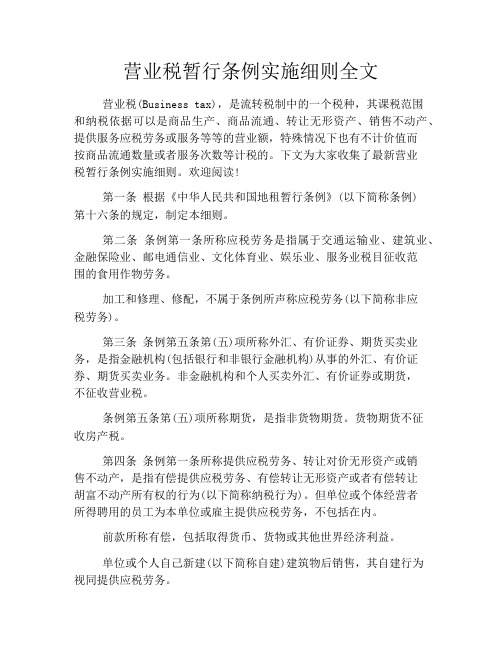
营业税暂行条例实施细则全文营业税(Business tax),是流转税制中的一个税种,其课税范围和纳税依据可以是商品生产、商品流通、转让无形资产、销售不动产、提供服务应税劳务或服务等等的营业额,特殊情况下也有不计价值而按商品流通数量或者服务次数等计税的。
下文为大家收集了最新营业税暂行条例实施细则。
欢迎阅读!第一条根据《中华人民共和国地租暂行条例》(以下简称条例)第十六条的规定,制定本细则。
第二条条例第一条所称应税劳务是指属于交通运输业、建筑业、金融保险业、邮电通信业、文化体育业、娱乐业、服务业税目征收范围的食用作物劳务。
加工和修理、修配,不属于条例所声称应税劳务(以下简称非应税劳务)。
第三条条例第五条第(五)项所称外汇、有价证券、期货买卖业务,是指金融机构(包括银行和非银行金融机构)从事的外汇、有价证券、期货买卖业务。
非金融机构和个人买卖外汇、有价证券或期货,不征收营业税。
条例第五条第(五)项所称期货,是指非货物期货。
货物期货不征收房产税。
第四条条例第一条所称提供应税劳务、转让对价无形资产或销售不动产,是指有偿提供应税劳务、有偿转让无形资产或者有偿转让胡富不动产所有权的行为(以下简称纳税行为)。
但单位或个体经营者所得聘用的员工为本单位或雇主提供应税劳务,不包括在内。
前款所称有偿,包括取得货币、货物或其他世界经济利益。
单位或个人自己新建(以下简称自建)建筑物后销售,其自建行为视同提供应税劳务。
转让债权有限产权非常有限或永久使用权,无偿以及处室将不动产无偿赠与他人,视同销售不动产。
第五条一项销售行为如果既涉及应税一项劳动报酬又涉及货物,为混合销售行为。
从事货物的生产、批发或电商的企业、企业性单位及个体经营者的混合销售行为,视为销售货物,不征收营业税;其他单位和个人的混合销售行为,视为提供支持应税劳务,应当征收营业税。
纳税人的销售行为是否属于混合销售行为,由税务总局国家税务总局所属征收机关确定。
第一款所称货物,是指有形动产,包括电力、热力、气体在内。
企业所得税法中英对照
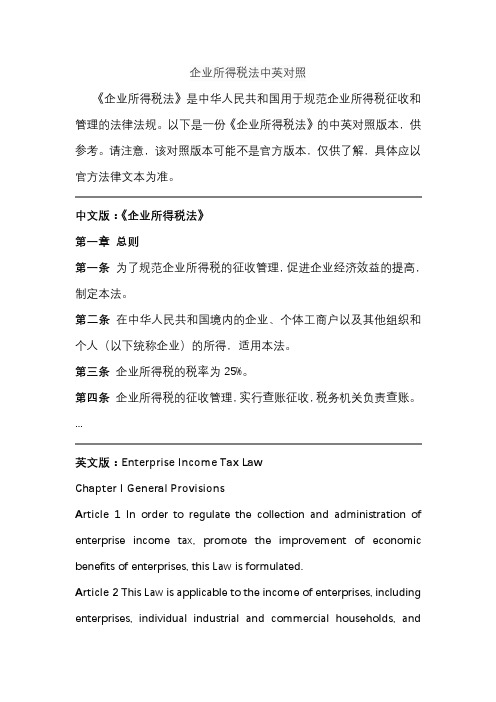
企业所得税法中英对照《企业所得税法》是中华人民共和国用于规范企业所得税征收和管理的法律法规。
以下是一份《企业所得税法》的中英对照版本,供参考。
请注意,该对照版本可能不是官方版本,仅供了解,具体应以官方法律文本为准。
中文版:《企业所得税法》第一章总则第一条为了规范企业所得税的征收管理,促进企业经济效益的提高,制定本法。
第二条在中华人民共和国境内的企业、个体工商户以及其他组织和个人(以下统称企业)的所得,适用本法。
第三条企业所得税的税率为25%。
第四条企业所得税的征收管理,实行查账征收,税务机关负责查账。
...英文版:Enterprise Income Tax LawChapter I General ProvisionsArticle 1In order to regulate the collection and administration of enterprise income tax, promote the improvement of economic benefits of enterprises, this Law is formulated.Article 2 This Law is applicable to the income of enterprises, including enterprises, individual industrial and commercial households, andother organizations and individuals (hereinafter collectively referred to as enterprises) within the territory of the People's Republic of China. Article 3 The tax rate for enterprise income tax is 25%.Article 4 The collection and administration of enterprise income tax shall be implemented through examination and verification, and the tax authorities shall be responsible for examination and verification. ...请注意,以上仅为简要对照版本,具体法律文本内容可能会有调整和修改。
营业税实施条例细则英文版
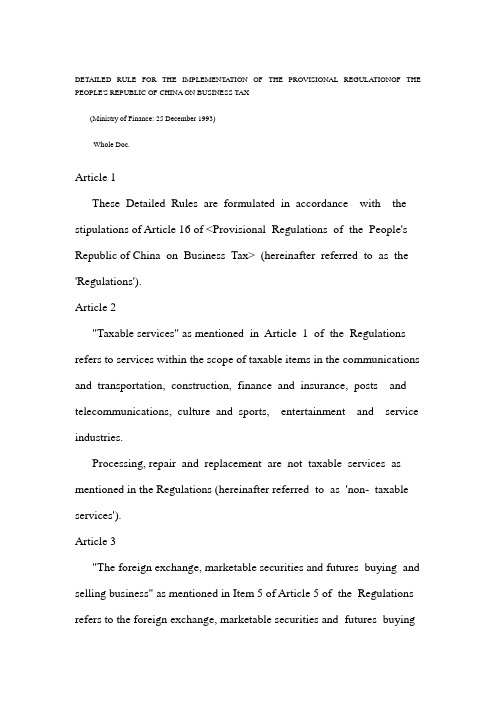
DETAILED RULE FOR THE IMPLEMENTA TION OF THE PROVISIONAL REGULA TIONOF THE PEOPLE'S REPUBLIC OF CHINA ON BUSINESS TAX(Ministry of Finance: 25 December 1993)Whole Doc.Article 1These Detailed Rules are formulated in accordance with the stipulations of Article 16 of <Provisional Regulations of the People's Republic of China on Business Tax> (hereinafter referred to as the 'Regulations').Article 2"Taxable services" as mentioned in Article 1 of the Regulations refers to services within the scope of taxable items in the communications and transportation, construction, finance and insurance, posts and telecommunications, culture and sports, entertainment and service industries.Processing, repair and replacement are not taxable services as mentioned in the Regulations (hereinafter referred to as 'non- taxable services').Article 3"The foreign exchange, marketable securities and futures buying and selling business" as mentioned in Item 5 of Article 5 of the Regulations refers to the foreign exchange, marketable securities and futures buyingand selling business carried on by financial institutions (including banks and non-bank financial institutions). The buying and selling of foreign exchange, marketable securities or futures by non-financial institutions or individuals shall not be subject to Business Tax."Futures" as mentioned in Item 5 of Article 5 of the Regulations refer to non-commodities futures. Futures on commodities shall not be subject to Business Tax.Article 4"Provision of taxable services, transfer of intangible assets or the sale of immovable properties" as mentioned in Article 1 of the Regulationsrefers to activities of providing taxable services, transferring intangible assets or ownership of immovable properties with consideration(hereinafter referred to as the 'taxable activities'). However, taxable services provided by the staff employed by units or individual operators to their own units or employers shall not be included therein.The term "with consideration" in the preceding paragraph includes receipt of currency, goods and other economic benefits.For units or individuals that sell their newly self- constructed buildings (hereinafter referred to as 'self- construction'), theirself-construction activities shall be regarded as provision of taxableservices.Transfers of limited property rights, or permanent rights, to use immovable properties, and transfers by units of immovable properties byway of gifts to others shall be regarded as sales of immovable properties.Article 5A sales activity that involves both taxable services and goods is deemed to be a mixed sales activity. Mixed sales activities of enterprises, enterprise units or individual business operators engaged in production, wholesale or retail of goods shall be classified as sales of goods, and Business Tax shall not be levied on the sales; mixed sales activities of other units and individuals shall be classified as provisionof taxable services, and Business Tax shall be levied on the sales.Whether taxpayers' sales activities are mixed sales activities shallbe determined by the collection authorities under the State Administration of Taxation."Goods" as mentioned in Paragraph 1 refers to tangible moveable goods, including electricity, heat and gas."Enterprises, enterprise units or individual business operators engaged in the production, wholesale and retail of goods" as mentioned inParagraph 1 include enterprises, units with an enterprise nature and individual business operators engaged principally in the production, wholesale and retail of goods, and also engaged in taxable services. Article 6For taxpayers engaged in both taxable services and the sales of goods or non-taxable services, the sales amount of taxable services and the sales amount of goods or non-taxable services shall be accounted for separately. For taxpayers that have not accounted for separately or cannot account for accurately, the taxable services and goods and non-taxable services shall together be subject to V alue Added Tax, and Business Tax shall not be levied.Whether the taxable services engaged concurrently by taxpayers are together subject to V alue Added Tax, this tax shall be determined by the collection authorities under the State Administration of Taxation.Article 7Except as otherwise stipulated in Article 8 of these Detailed Rules, any one of the following activities shall be regarded as provision of taxable services, transfer of intangible assets or sale of immovable properties within the territory of the People's Republic of China (hereinafter referred to as 'within the territory') as mentioned in Article 1 of the Regulations:(1) Provision of services occurs within the territory;(2) Transportation from within the territory of passengers or cargos to outside the territory;(3) Organization of tourist groups within the territory to travel outside the territory;(4) Transfer of intangible assets to be used within the territory.(5) Sales of immovable properties located within the territoryArticle 8Any one of the following situations shall be providing insurance services within the territory:(1) Insurance services provided by insurance organizations within the territory, except for insurance provided for export goods by insurance organizations within the territory.(2) Insurance services provided by insurance organizations outside the territory in relation to goods within the territory.Article 9"Units" as mentioned in Article 1 of the Regulations refers to State-owned enterprises, collectively owned enterprises, private enterprises, joint stock enterprises, other enterprises and administrative units, institutions, military units, social groups and other units."Individuals" as mentioned in Article 1 of the Regulations refers to individual industrial or commercial households and other individuals thathave business activities.Article 10For enterprises which lease or contract to other to operate, the lessees or sub-contractors shall be the taxpayer.Article 11Except otherwise stipulated in Article 12 of these Detailed Rules, units that are liable to Business Tax shall be those that have taxable activities and receive money, goods or other economic benefits from the other parties. They shall include units both with and without independent accounting.Article 12The taxpayer for the business of central railway transportation shall be the Ministry of Railways. The taxpayers for the business of Sino-foreign equity joint venture railway transportation shall be the joint venture railway companies. The taxpayers for the business of local railway transportation shall be the local organization for railway administration. The taxpayers for the business of provisional administration for infrastructural route transportation shall be the organization for provisional administration for infrastructural routes.Units engaged in the business of waterway, air, pipeline and other land transportation liable to Business Tax shall be those units engaged in transportation business and accountable for profit or loss.Article 13Charges of legislative, judicial and administrative authorities that meet the following conditions shall not be subject to Business Tax;(1) Charges which are permitted under official documents by the State Council, provincial People's governments, or the finance or pricing departments thereunder, and where the charging standard is in accordancewith the stipulations of the documents.(2) Charges which are collected directly by the legislative, judicial and administrative authorities themselves.Article 14"Other charges" as mentioned in Article 5 of the Regulations shall include handing fees, funds, fund raising fees, receipts on behalf, payment on behalf and other charges of every nature received from otherparties.All other charges shall be included in the turnover in computing the tax payable regardless of the treatments applicable according to the stipulations of the accounting policies.Article 15Where the prices of the taxpayers providing taxable services,transferring intangible assets or selling immovable properties are obviously low and without proper justification, the competent tax authorities shall have the right to determine the turnover according to the following sequence:(1) Determined according to the average prices of similar services provided or similar immovable properties sold by the taxpayers in the samemonth.(2) Determined according to the average prices of similar services provided or similar immovable properties sold by the taxpayers in the mostrecent period.(3) Determined according to the following formula:Assessable Operating (1 + the cost plus margin rate)value = costs or X -------------------------------Project costs (1 - Business Tax rate)The cost-plus margin rate in the above formula shall be determined by the tax authorities under the People's governments of the provinces, autonomous regions and municipalities.Article 16In accordance with the stipulations of Article 4 of the Regulations, taxpayers settling the turnover in foreign currencies can select to convert the turnover into Renminbi according to the exchange rate quotedby the State of either the date the turnover occurs or on the first dateof the month (the average rate in principle). However, the Renminbi conversion rate for the turnover of financial and insurance enterprises shall be the exchange rate ascertained in the prior year's financial statements.Taxpayers shall decide in advance the conversion rate selected. Once selected, it cannot be changed within one year.Article 17Turnover of transportation enterprises engaged in through transport business shall be the turnover actually received."Other situations" as mentioned in Item 6 of Article 5 of the Regulations include tourist enterprises organising tourist groups to travel within the territory of China. The turnover shall be the balanceof tourist fees received after deduction of room charges, meal charges, transportation, admission fees and other charges paid to other units on behalf of the tourists.Article 18For taxpayers engaged in construction, repair and decoration project operations, their turnover shall include the prices of raw materials, other materials and energy used in the projects irrespective of the method in which the accounts are settled with the other parties.For taxpayers engaged in installation project operations, as far as the price of the equipment installed is taken as part of installation project sum, their turnover shall include the price of the equipment. Article 19The turnover of self-construction activities as mentioned in Article4 of these Detailed Rules shall be determined with reference to the stipulations of Article 15 of these Detailed Rules.Article 20"Re-lending business" as mentioned in Item (4) of Article 5 of the Regulations refers to the business of lending to others the funds borrowed. Lending to others with the funds from deposits taken from unitsor individuals and the funds from lender's own capital contributions shall not be regarded as relenting business.Article 21For insurance business that reinsures with other parties, the turnover of the initial insurance business shall be the total insurance premiums after deduction of the premiums paid to the reinsurers.Article 22For entertainment performances by units or individuals, the turnover shall be the total box-office proceeds or block-booking proceeds after deduction of the payments to units providing performance venues, entertainment companies and managers.Article 23Turnover of the entertainment business shall be the various charges collected from customers in the entertainment business operations, including box-office receipts, on-stage fees, song dedication fees, charges on cigarettes and drinks, and other charges in the entertainment business operations.Article 24For travel business, the turnover shall be the balance of total charges after deduction of payments to other units for meals, lodging and transportation for the tourists.For travel enterprises that organise tours within the territory and then hand over the groups to other travel enterprises, the turnover shall be determined with reference to the stipulations of Item 2 of Article 5 of the Regulations.Article 25For units giving immovable properties to others as free gift, the turnover shall be determined with reference to the stipulations of Article15 of these Detailed Rules.Article 26The scope of the tax-exempt items as stipulated in Article 6 of the Regulations shall be defined as follows:(1) "Personal services provided on individual basis by the disabled" as mentioned in Paragraph 1, Item 2 refers to services provided to the Public by the disabled individual.(2) "Medical services provided by hospitals, clinics and other medical institutions" as mentioned in Paragraph 1, Item 3 refers to such services as diagnosis and treatment to patients, epidemic prevention, child delivery and family planning, as well as the business of providing medicine, medical apparatus, hospital lodging and meals in relation to these services.(3) "Schools and other educational institutions" as mentioned in Paragraph 1, Item 4 refers to ordinary schools and schools of various kinds approved to be established by the People's governments above theprefecture and city levels or departments for educational administration under governments of the same level and where the academic qualificationsof their students are recognized by the State.(4) "Agricultural mechanical ploughing" as mentioned in Paragraph 1, Item 5 refers to the business of farming operations applying agricultural machinery in farming, forestry and husbandry (including ploughing, planting, harvesting, threshing and plant protection)."Irrigation and drainage" refers to the business of irrigation and drainage of farmland."Prevention and treatment of diseases and insect pests" refers to the business of forecast, prevention and treatment of diseases and insect pests for farming, forestry, husbandry and fishery."Insurance for farming and husbandry" refers to the business of providing insurance to animals and plants grown and raised in planting, breeding and husbandry."Related technical training" refers to technical training services related to the business of agricultural mechanical ploughing, irrigation and drainage, prevention and treatment of diseases and insect pests, and plant protection, as well as services to enable the farmers to obtain knowledge of insurance for farming and husbandry.The scope of the tax exemption for the breeding and the prevention and treatment of diseases of poultry, livestock and aquatic animals includes the business of providing medicine and medical apparatus in relation to those services.(5) "Cultural activities conducted by memorial hall, museum, culturalcentre, art gallery, exhibition hall, academy of painting and calligraphy, library and cultural protective units" as mentioned in Paragraph 1, Item 6 refers to cultural activities that fall within the taxable scope of taxable items under culture and sports activities conducted by those units in their own locations. The admission fees refers to the box-office receipts on the sales at the first entrance."Admission fees for cultural and religious activities conducted at places of religious worship" refers to cultural and religious activities held by temples, Taoist temples, mosques and churches.Article 27The application of the Business Tax minimum threshold as mentioned inArticle 8 of the Regulations shall be limited to individuals.Ranges for the Business Tax minimum threshold are as follows:For those assessable on a period basis, the Business Tax minimum threshold shall be a monthly turnover of 200-800 yuan.For those assessable on a transaction basis, the Business Tax minimumthreshold shall be turnover of 50 yuan per transaction (or per day).Taxpayers whose turnovers reach the minimum threshold shall computethe tax payable based on the total turnover.The tax authorities under the People's governments of provinces, autonomous regions and municipalities shall determine the minimu mthreshold locally applicable within the prescribed ranges and in accordance with the actual conditions, and shall report the amounts to the State Administration of Taxation for their records.Article 28For taxpayers transferring land use rights or selling immovable properties that accept receipts in advance, the timing at which the tax liability arises shall be the date on which the advance receipts are received.For taxpayers that have self-construction activities as mentioned in Article 4 of these Detailed Rules, the timing at which the tax liability arises on the self-construction activities shall be the date on which the self-constructed buildings are sold and the turnovers are received or the documented evidence of the right to collect the sales sum is obtained.For taxpayer giving immovable properties to others as free gift, the timing at which the tax liability arises shall be the date on which the titles of the immovable properties are transferred.Article 29Other withholding agents as mentioned in Article 11 of theRegulations are defined as follows:(1) For overseas units or individuals that have taxable activities within the territory but have not set up any establishment within the territory, the agents shall be the withholding agents for their tax payable. If there are no agents, the transferees and the purchasers shall be the withholding agents.(2) For units or individuals that present performances where the tickets are sold by others, the ticket sellers shall be the withholding agents for their tax payable.(3) For individual performance managers, the ticket sellers shall be the withholding agents on their tax payable on the performance managementbusiness.(4) For reinsurance business, the initial insurers shall be the withholding agents.(5) For individuals transferring other intangible assets as mentionedin Item 2, Article 12 of the Regulations, the transferees shall be the withholding agents for their tax payable.Article 30For taxpayers providing taxable services that take place in a different county (or city) that should report and pay tax with thecompetent tax authorities where the services taken place but have not reported or paid the tax, the competent tax authorities where the establishments are located or where the individuals reside shall collect the overdue tax.Article 31Taxpayers with contracted projects extending across provinces, autonomous regions and municipalities shall report and pay tax to the competent tax authorities where the establishments are located.Article 32For taxpayers that have taxable activities within the area of their own province, autonomous region and municipality, and need to change thetax payment location, the location shall be determined by tax authorities under the People's governments of the province, autonomous region or municipality.Article 33The assessable period for the financial industry (excluding pawn-broking) shall be one quarter of a year.The assessable period for the insurance industry shall be one month. Article 34The terms "above" and "below" as mentionedin these Detailed Rulesalso include the figure or level itself.Article 35These Detailed Rules shall be interpreted by the Ministry of Finance or by the State Administration of Taxation.Article 36These Detailed Rules shall be implemented on the same day the Regulations are come into effect. The <Detailed Rules and Regulations forthe Implementation of the Draft Regulations of the People's Republic of China on Business Tax> promulgated on September 28, 1984 shall be repealedon the same date.。
- 1、下载文档前请自行甄别文档内容的完整性,平台不提供额外的编辑、内容补充、找答案等附加服务。
- 2、"仅部分预览"的文档,不可在线预览部分如存在完整性等问题,可反馈申请退款(可完整预览的文档不适用该条件!)。
- 3、如文档侵犯您的权益,请联系客服反馈,我们会尽快为您处理(人工客服工作时间:9:00-18:30)。
营业税实施条例细则英文版DETAILED RULE FOR THE IMPLEMENTATION OF THE PROVISIONAL REGULATIONOF THE PEOPLE'S REPUBLIC OF CHINA ON BUSINESS TAX(Ministry of Finance: 25 December 1993)Whole Doc.Article 1These Detailed Rules are formulated in accordance with th estipulations of Article 16 of <Provisional Regulations of the People'sRepublic of China on Business Tax> (hereinafter referred to as the'Regulations').Article 2"Taxable services" as mentioned in Article 1 of the Regulationsrefers to services within the scope of taxable items in the communicationsand transportation, construction, finance and insurance, posts a ndtelecommunications, culture and sports, entertainment and se rviceindustries.Processing, repair and replacement are not taxable services as mentioned in the Regulations (hereinafter referred to as 'non- taxableservices').Article 3"The foreign exchange, marketable securities and futures buying andselling business" as mentioned in Item 5 of Article 5 of the Regulationsrefers to the foreign exchange, marketable securities and futures buyingand selling business carried on by financial institutions (including banksand non-bank financial institutions). The buying and selling of foreignexchange, marketable securities or futures by non-financial institutionsor individuals shall not be subject to Business Tax."Futures" as mentioned in Item 5 of Article 5 of the Regulationsrefer to non-commodities futures. Futures on commodities shall not besubject to Business Tax.Article 4"Provision of taxable services, transfer of intangible assets or the sale of immovable properties" as mentioned in Article 1 of the Regulationsrefers to activities of providing taxable services, transferring intangible assets or ownership of immovable properties with consideration(hereinafter referred to as the 'taxable activities'). However, taxableservices provided by the staff employed by units or individual operatorsto their own units or employers shall not be included therein.The term "with consideration" in the preceding paragraph includesreceipt of currency, goods and other economic benefits.For units or individuals that sell their newly self- constructed buildings (hereinafter referred to as 'self- construction'), their self-construction activities shall be regarded as provision of taxable services.Transfers of limited property rights, or permanent rights, to useimmovable properties, and transfers by units of immovable properties byway of gifts to others shall be regarded as sales of immovable properties.Article 5A sales activity that involves both taxable services and goods is deemed to be a mixed sales activity. Mixed sales activities of enterprises, enterprise units or individual business operators engaged inproduction, wholesale or retail of goods shall be classified as sales of goods, and Business Tax shall not be levied on the sales; mixed salesactivities of other units and individuals shall be classified as provision of taxable services, and Business Tax shall be levied on the sales.Whether taxpayers' sales activities are mixed sales activities shall be determined by the collection authorities under the State Administrationof Taxation."Goods" as mentioned in Paragraph 1 refers to tangible moveablegoods, including electricity, heat and gas."Enterprises, enterprise units or individual business operators engaged in the production, wholesale and retail of goods" as mentioned inParagraph 1 include enterprises, units with an enterprise nature andindividualbusiness operators engaged principally in the production, wholesale and retail of goods, and also engaged in taxable services. Article 6For taxpayers engaged in both taxable services and the sales of goodsor non-taxable services, the sales amount of taxable services and thesales amount of goods or non-taxable services shall be accounted forseparately. For taxpayers that have not accounted for separately or cannotaccount for accurately, the taxable services and goods and non-taxableservices shall together be subject to Value Added Tax, and Business Taxshall not be levied.Whether the taxable services engaged concurrently by taxpayers aretogether subject to Value Added Tax, this tax shall be determined by thecollection authorities under the State Administration of Taxation. Article 7Except as otherwise stipulated in Article 8 of these Detailed Rules, any one of the following activities shall be regarded as provision of taxable services, transfer of intangible assets or sale of immovable properties within the territory of the People's Republic of China (hereinafter referred to as 'within the territory') as mentioned in Article 1 of the Regulations:(1) Provision of services occurs within the territory;(2) Transportation from within the territory of passengers or cargosto outside the territory;(3) Organization of tourist groups within the territory to travel outside the territory;(4) Transfer of intangible assets to be used within the territory.(5) Sales of immovable properties located within the territory Article 8Any one of the following situations shall be providing insuranceservices within the territory:(1) Insurance services provided by insurance organizations within theterritory, except for insurance provided for export goods by insuranceorganizations within the territory.(2) Insurance services provided by insurance organizations outsidethe territory in relation to goods within the territory.Article 9"Units" as mentioned in Article 1 of the Regulations refers to State-owned enterprises, collectively owned enterprises, priv ateenterprises, joint stock enterprises, other enterprises and administrativeunits, institutions, military units, social groups and other units."Individuals" as mentioned in Article 1 of the Regulations refers toindividual industrial or commercial households and other individuals thathave business activities.Article 10For enterprises which lease or contract to other to operate, the lessees or sub-contractors shall be the taxpayer.Article 11Except otherwise stipulated in Article 12 of these Detailed Rules, units that are liable to Business Tax shall be those that have taxable activities and receive money, goods or other economic benefits from theother parties. They shall include units both with and without independentaccounting.Article 12The taxpayer for the business of central railway transportation shallbe the Ministry of Railways. The taxpayers for the business o fSino-foreign equity joint venture railway transportation shall be thejoint venture railway companies. The taxpayers for the business of localrailway transportation shall be the local organization for railwayadministration. The taxpayers for the business of provisio naladministrationfor infrastructural route transportation shall be the organization for provisional administration for infrastructural routes.Units engaged in the business of waterway, air, pipeline and otherland transportation liable to Business Tax shall be those units engaged intransportation business and accountable for profit or loss.Article 13Charges of legislative, judicial and administrative authorities thatmeet the following conditions shall not be subject to Business Tax;(1) Charges which are permitted under official documents by the StateCouncil,provincial People's governments, or the finance or pricing departments thereunder, and where the charging standard is in accordancewith the stipulations of the documents.(2) Charges which are collected directly by the legislative, judicialand administrative authorities themselves.Article 14"Other charges" as mentioned in Article 5 of the Regulations shallinclude handing fees, funds, fund raising fees, receipts on behalf, payment on behalf and other charges of every nature received from otherparties.All other charges shall be included in the turnover in computing thetax payable regardless of the treatments applicable according to thestipulations of the accounting policies.Article 15Where the prices of the taxpayers providing taxable services, transferring intangible assets or selling immovable properties ar eobviously low and without proper justification, the competent t axauthorities shall have the right to determine the turnover according tothe following sequence:(1) Determined according to the average prices of similar servicesprovided or similar immovable properties sold by the taxpayers in the samemonth.(2) Determined according to the average prices of similar servicesprovided or similar immovable properties sold by the taxpayers in the mostrecent period.(3) Determined according to the following formula:Assessable Operating (1 + the cost plus margin rate)value = costs or X -------------------------------Project costs (1 - Business Tax rate)The cost-plus margin rate in the above formula shall be determined bythe tax authorities under the People's governments of the provinces,autonomous regions and municipalities.Article 16In accordance with the stipulations of Article 4 of the Regulations, taxpayers settling the turnover in foreign currencies can select to convert the turnover into Renminbi according to the exchange rate quotedby the State of either the date the turnover occurs or on the first dateof the month (the average rate in principle). However, the Renminbiconversion rate for the turnover of financial and insurance enterprisesshall be the exchange rate ascertained in the prior year's financial statements.Taxpayers shall decide in advance the conversion rate selected. Onceselected, it cannot be changed within one year.Article 17Turnover of transportation enterprises engaged in through transportbusiness shall be the turnover actually received."Other situations" as mentioned in Item 6 of Article 5 of the Regulationsinclude tourist enterprises organising tourist groups totravel within the territory of China. The turnover shall be the balanceof tourist fees received after deduction of room charges, meal charges,transportation, admission fees and other charges paid to other units onbehalf of the tourists.Article 18For taxpayers engaged in construction, repair and decoration projectoperations, their turnover shall include the prices of raw materials, other materials and energy used in the projects irrespective of the methodin which the accounts are settled with the other parties.For taxpayers engaged in installation project operations, as far asthe price of the equipment installed is taken as part of installation project sum, their turnover shall include the price of the equipment.Article 19The turnover of self-construction activities as mentioned in Article4 of these Detailed Rules shall be determined with reference to thestipulations of Article 15 of these Detailed Rules.Article 20"Re-lending business" as mentioned in Item (4) of Article 5 of theRegulations refers to the business of lending to others the funds borrowed. Lending to others with the funds from deposits taken from unitsor individuals and the funds from lender's own capital contributions shallnot be regarded as relenting business.Article 21For insurance business that reinsures with other parties, the turnover of the initial insurance business shall be the total insurancepremiums after deduction of the premiums paid to the reinsurers. Article 22For entertainment performances by units or individuals, the turnovershall be the total box-office proceeds or block-booking proceeds afterdeduction of the payments to units providing performance ven ues,entertainment companies and managers.Article 23Turnover of the entertainment business shall be the various chargescollected from customers in the entertainment business operatio ns,including box-office receipts, on-stage fees, song dedication fees, charges on cigarettes and drinks, and other charges in the entertainmentbusiness operations.Article 24For travel business, the turnover shall be the balance of total charges after deduction of payments to other units for meals, lodging andtransportation for the tourists.For travel enterprises that organise tours within the territory andthen hand over the groups to other travel enterprises, theturnover shallbe determined with reference to the stipulations of Item 2 of Article 5 ofthe Regulations.Article 25For units giving immovable properties to others as free gift, the turnover shall be determined with reference to the stipulations of Article15 of these Detailed Rules.Article 26The scope of the tax-exempt items as stipulated in Article 6 of theRegulations shall be defined as follows:(1) "Personal services provided on individual basis by the disabled"as mentioned in Paragraph 1, Item 2 refers to services provided to thePublic by the disabled individual.(2) "Medical services provided by hospitals, clinics and other medical institutions" as mentioned in Paragraph 1, Item 3 refers to suchservices as diagnosis and treatment to patients, epidemic prevention,child delivery and family planning, as well as the business of providingmedicine, medical apparatus, hospital lodging and meals in relation tothese services.(3) "Schools and other educational institutions" as mentioned inParagraph 1, Item 4 refers to ordinary schools and schools of variouskinds approved to be established by the People's governments above theprefecture and city levels or departments for educational administrationunder governments of the same level and where the academic qualificationsof their students are recognized by the State.(4) "Agricultural mechanical ploughing" as mentioned in Paragraph 1,Item 5 refers to the business of farming operations applying agriculturalmachinery in farming, forestry and husbandry (including ploug hing,planting, harvesting, threshing and plant protection)."Irrigation and drainage" refers to the business of irrigation anddrainage of farmland."Prevention and treatment of diseases and insect pests" refers to thebusiness of forecast, prevention and treatment of diseases and insectpests for farming, forestry, husbandry and fishery."Insurance for farming and husbandry" refers to the business ofproviding insurance to animals and plants grown and raised in planting,breeding and husbandry."Related technical training" refers to technical training services related to the business of agricultural mechanical ploughing, irrigationand drainage, prevention and treatment of diseases and insect pests, andplant protection, as well as services to enable the farmers to obtainknowledge of insurance for farming and husbandry.The scope of the tax exemption for the breeding and the preventionand treatment of diseases of poultry, livestock and aquatic animalsincludes the business of providing medicine and medical apparatus inrelation to those services.(5) "Cultural activities conducted by memorial hall, museum, culturalcentre, art gallery, exhibition hall, academy of painting and calligraphy,library and cultural protective units" as mentioned in Paragraph 1, Item 6refers to cultural activities that fall within the taxable scope of taxable items under culture and sports activities conducted by those unitsin their own locations. The admission fees refers to the box-office receipts on the sales at the first entrance."Admission fees for cultural and religious activities conducted atplaces of religious worship" refers to cultural and religious activitiesheld by temples, Taoist temples, mosques and churches.Article 27The application of the Business Tax minimum threshold as mentioned inArticle 8 of the Regulations shall be limited to individuals.Ranges for the Business Tax minimum threshold are as follows: For those assessable on a period basis, the Business Tax minimumthreshold shall be a monthly turnover of 200-800 yuan.For those assessable on a transaction basis, the Business Tax minimumthreshold shall be turnover of 50 yuan per transaction (or per day).Taxpayers whose turnovers reach the minimum threshold shall computethe tax payable based on the total turnover.The tax authorities under the People's governments of provinces,autonomous regions and municipalities shall determine the mi nimumthreshold locally applicable within the prescribed ranges and i naccordance with the actual conditions, and shall report the amounts to theState Administration of Taxation for their records.Article 28For taxpayers transferring land use rights or selling immovableproperties that accept receipts in advance, the timing at which the taxliability arises shall be the date on which the advance receipts are received.For taxpayers that have self-construction activities as mentioned inArticle 4 of these Detailed Rules, the timing at which the tax liability arises on the self-construction activities shall be the date on which theself-constructed buildings are sold and the turnovers are received or thedocumented evidence of the right to collect the sales sum is obtained.For taxpayer giving immovable properties to others as free gift, thetiming at which the tax liability arises shall be the date on which thetitles of the immovable properties are transferred.Article 29Other withholding agents as mentioned in Article 11 of the Regulations are defined as follows:(1) For overseas units or individuals that have taxable activities within the territory but have not set up any establishment within theterritory, the agents shall be the withholding agents for their tax payable. If there are no agents, the transferees and the purchasers shallbe the withholding agents.(2) For units or individuals that present performances where thetickets are sold by others, the ticket sellers shall be the withholding agents for their tax payable.(3) For individual performance managers, the ticket sellers shall bethe withholding agents on their tax payable on the performance managementbusiness.(4) For reinsurance business, the initial insurers shall be the withholding agents.(5) For individuals transferring other intangible assets as mentionedin Item 2, Article 12 of the Regulations, the transferees shall be the withholding agents for their tax payable.Article 30For taxpayers providing taxable services that take place in a different county (or city) that should report and pay tax with the competent tax authorities where the services taken place but have notreportedor paid the tax, the competent tax authorities where the establishments are located or where the individuals reside shall collectthe overdue tax.Article 31Taxpayers with contracted projects extending across province s,autonomous regions and municipalities shall report and pay tax to thecompetent tax authorities where the establishments are located. Article 32For taxpayers that have taxable activities within the area of their own province, autonomous region and municipality, and need to change thetax payment location, the location shall be determined by tax authoritiesunder the People's governments of the province, autonomous region or municipality.Article 33The assessable period for the financial industry (excluding pawn-broking) shall be one quarter of a year.The assessable period for the insurance industry shall be one month.Article 34The terms "above" and "below" as mentioned in these Detailed Rulesalso include the figure or level itself.Article 35These Detailed Rules shall be interpreted by the Ministry of Financeor by the State Administration of Taxation.Article 36These Detailed Rules shall be implemented on the same day theRegulations are come into effect. The <Detailed Rules and Regulations forthe Implementation of the Draft Regulations of the People's Republic ofChina on Business Tax> promulgated on September 28, 1984 shall be repealedon the same date.。
